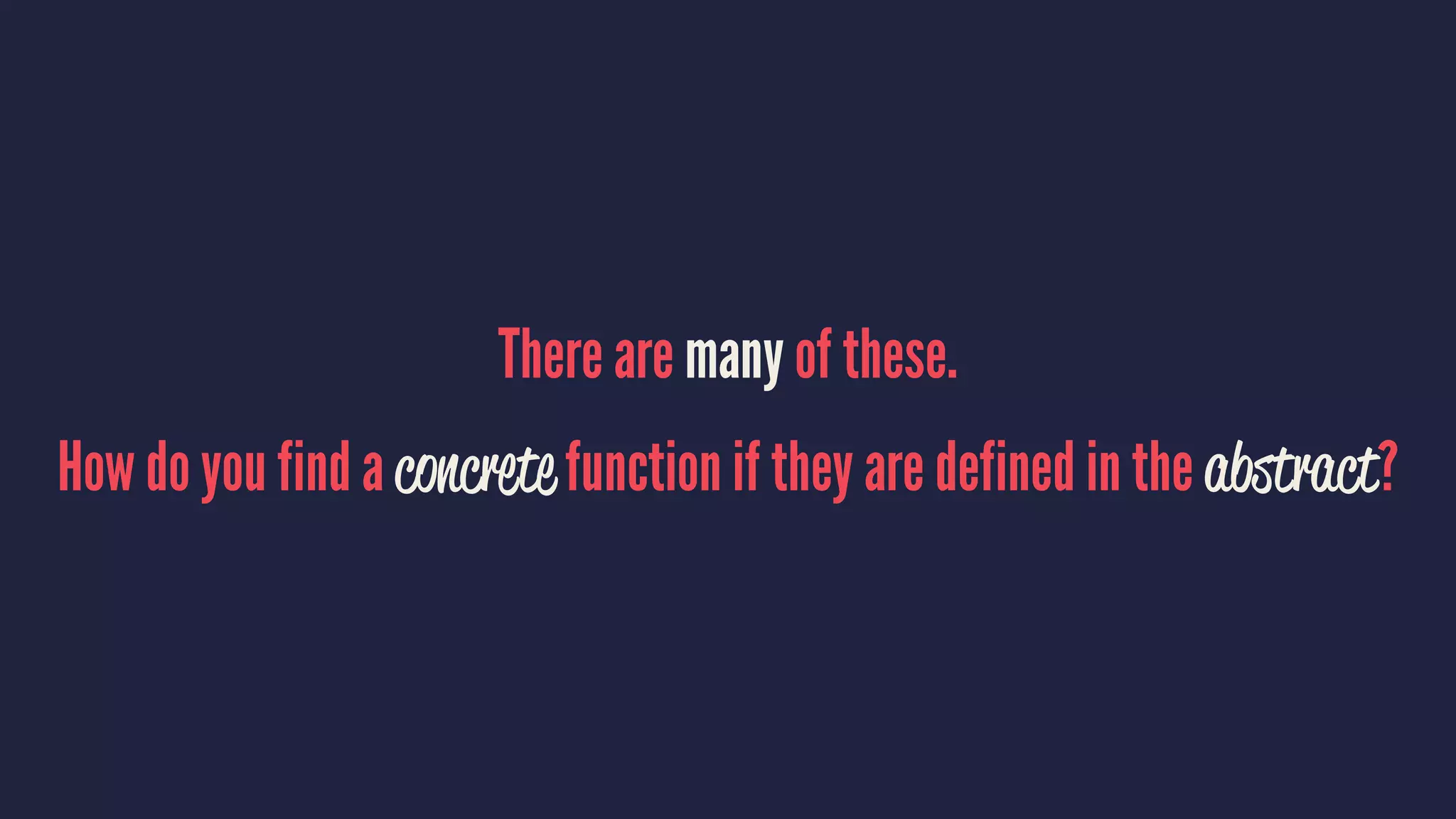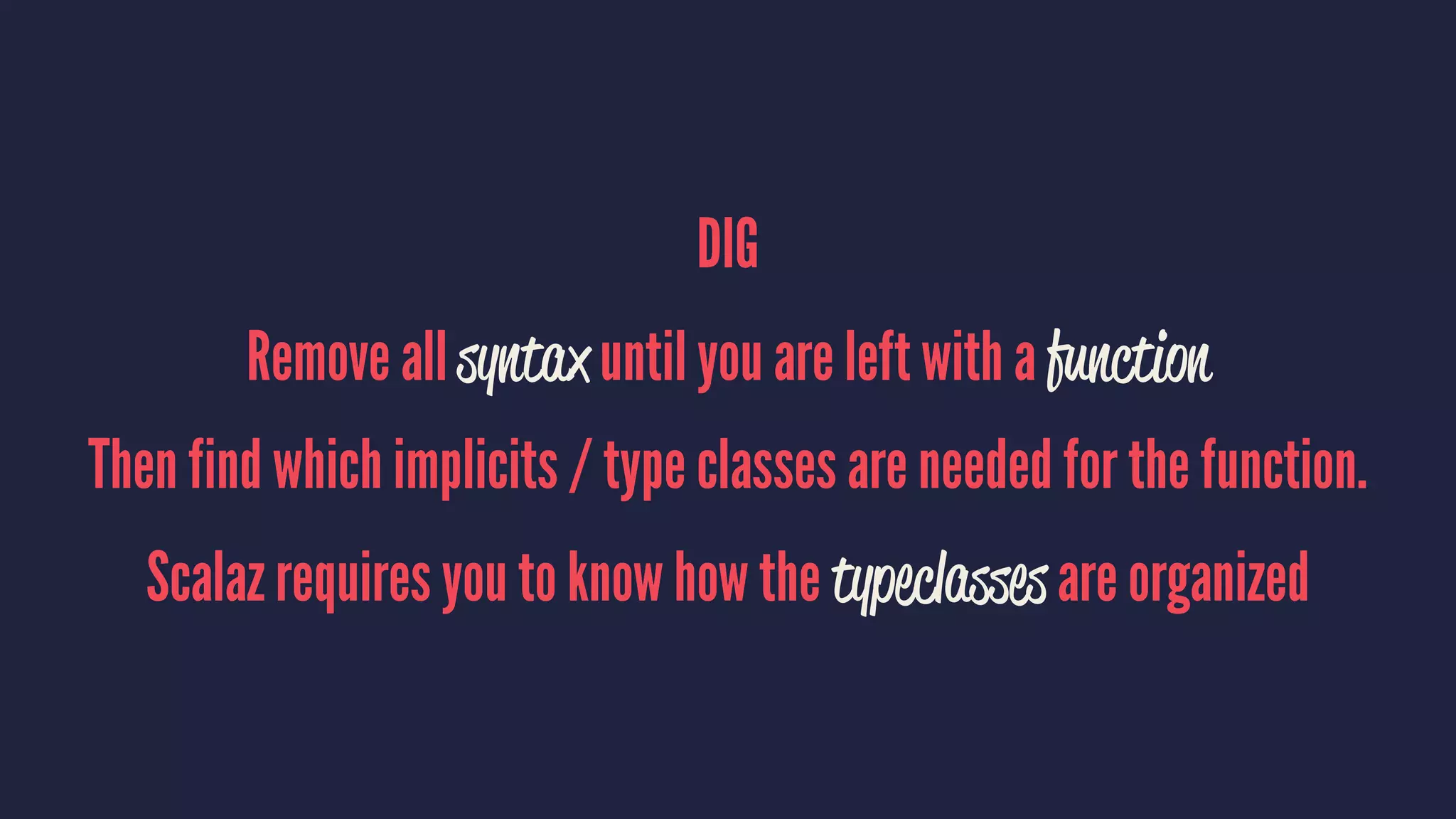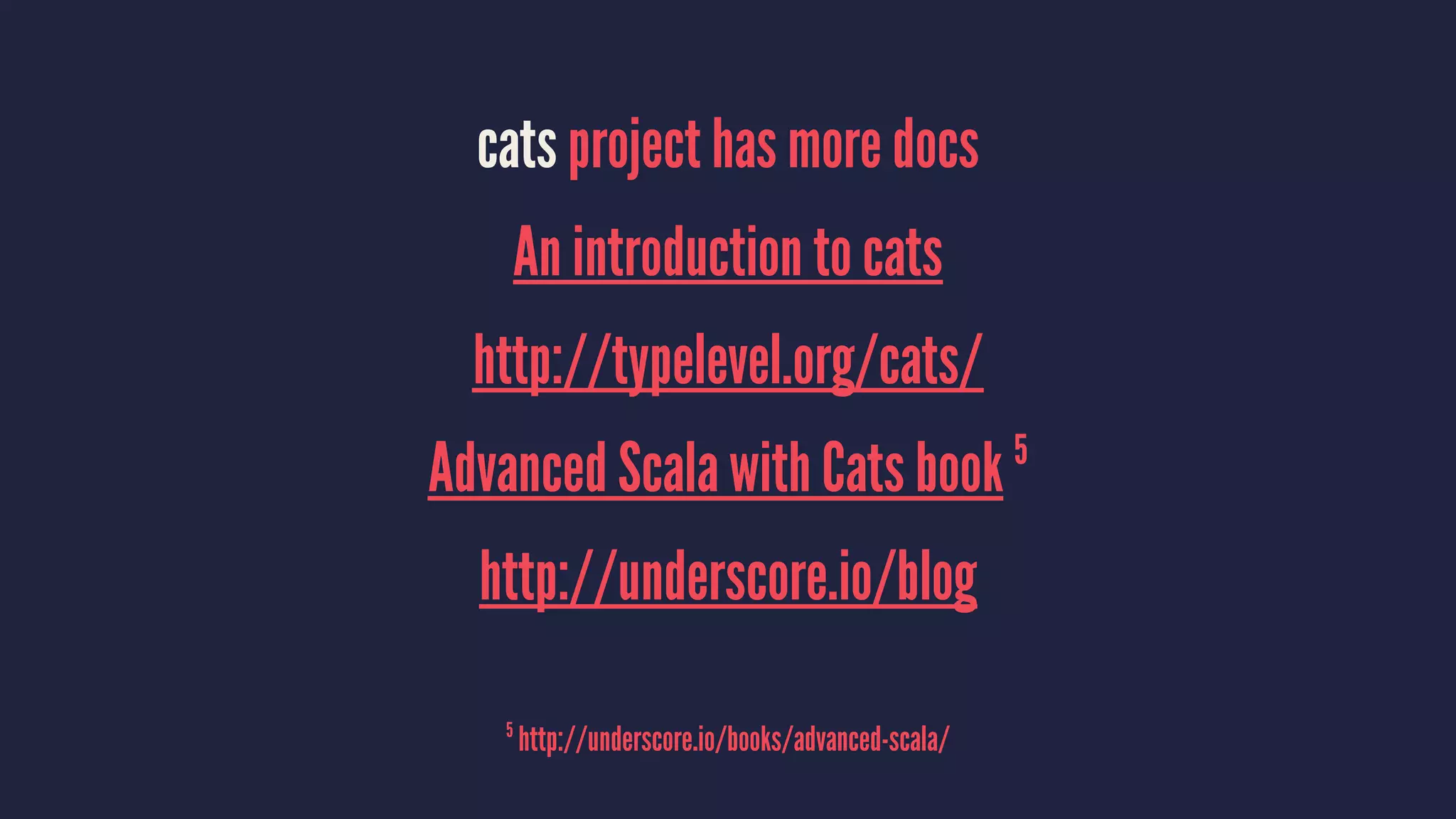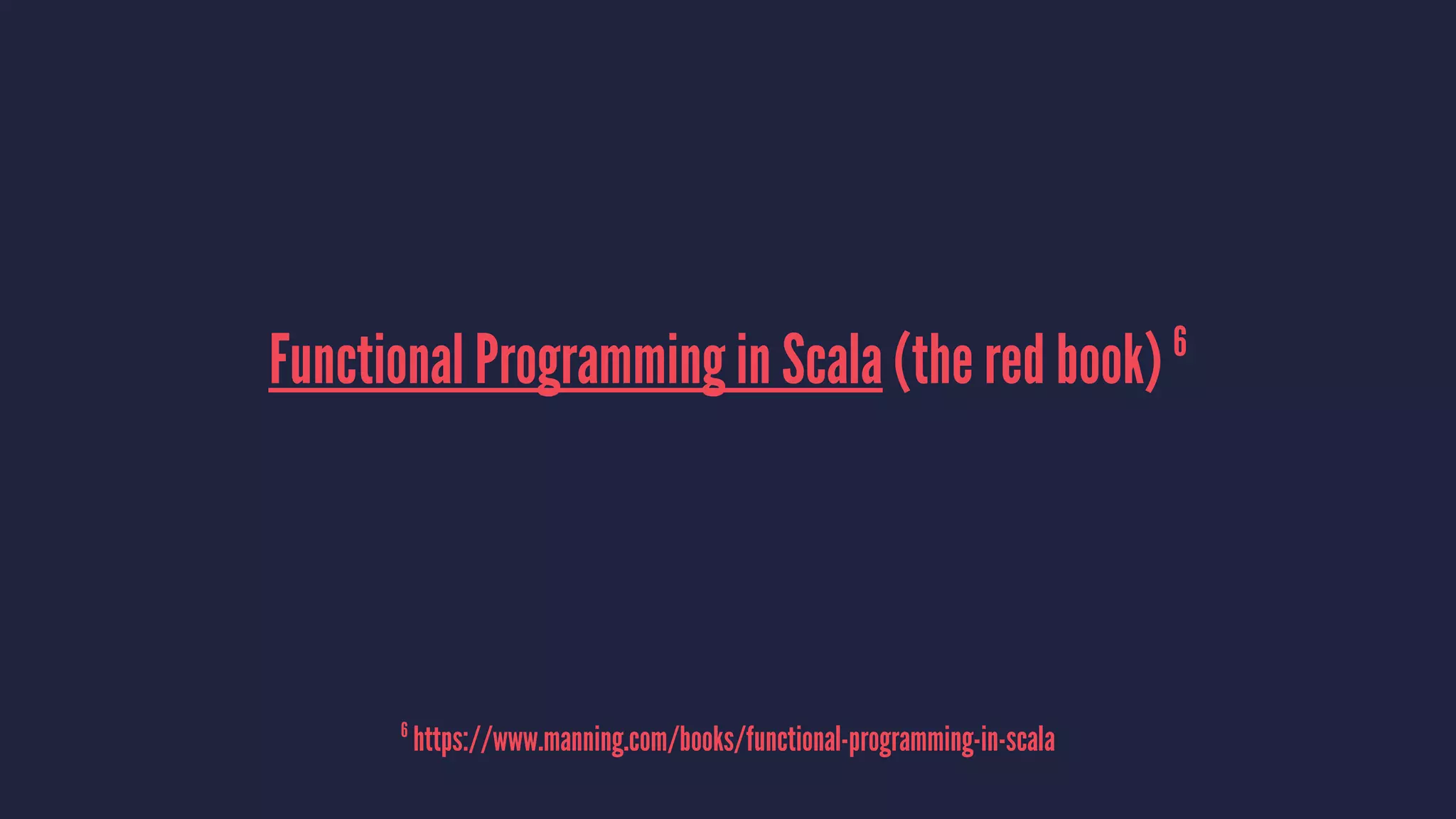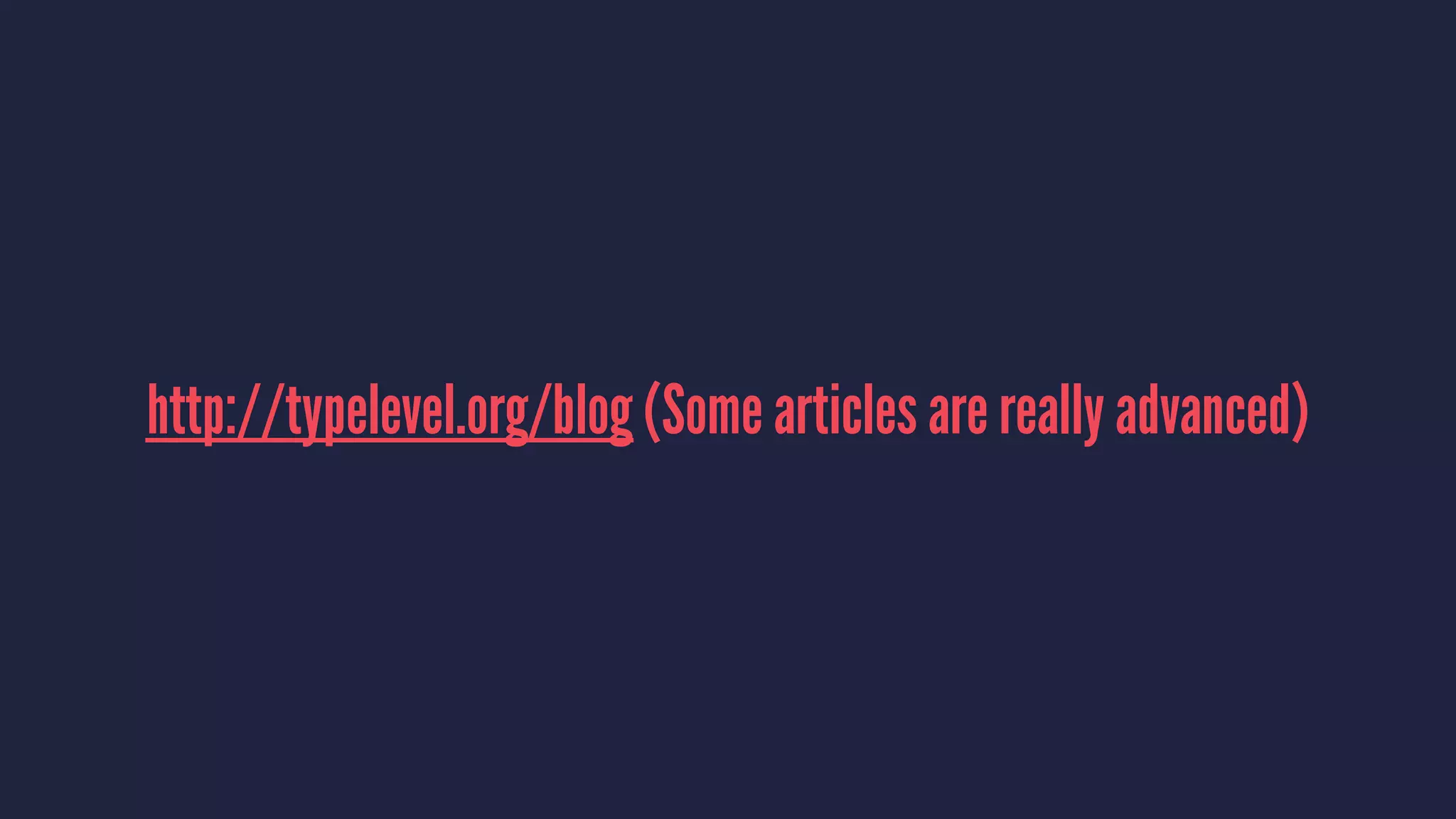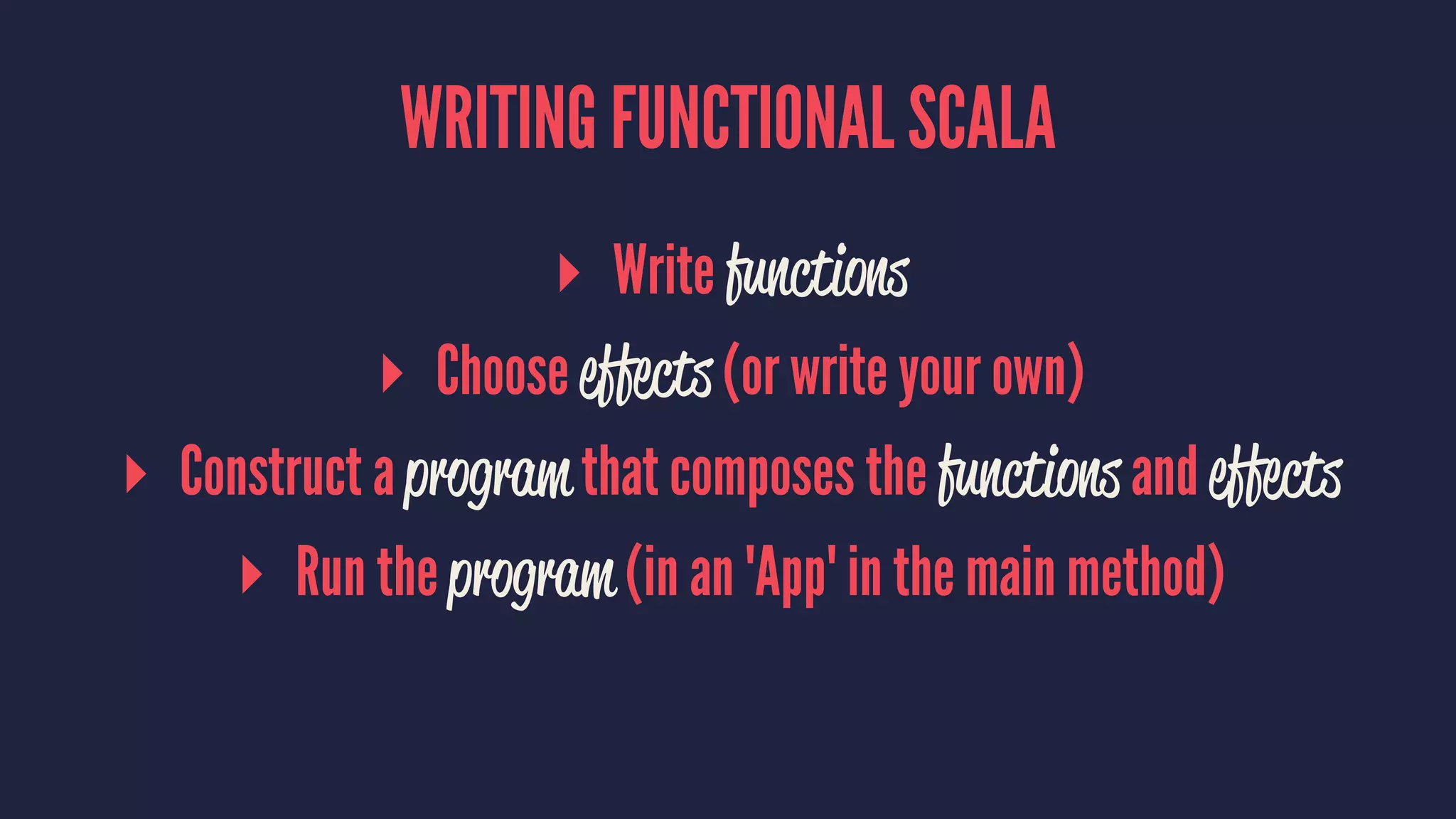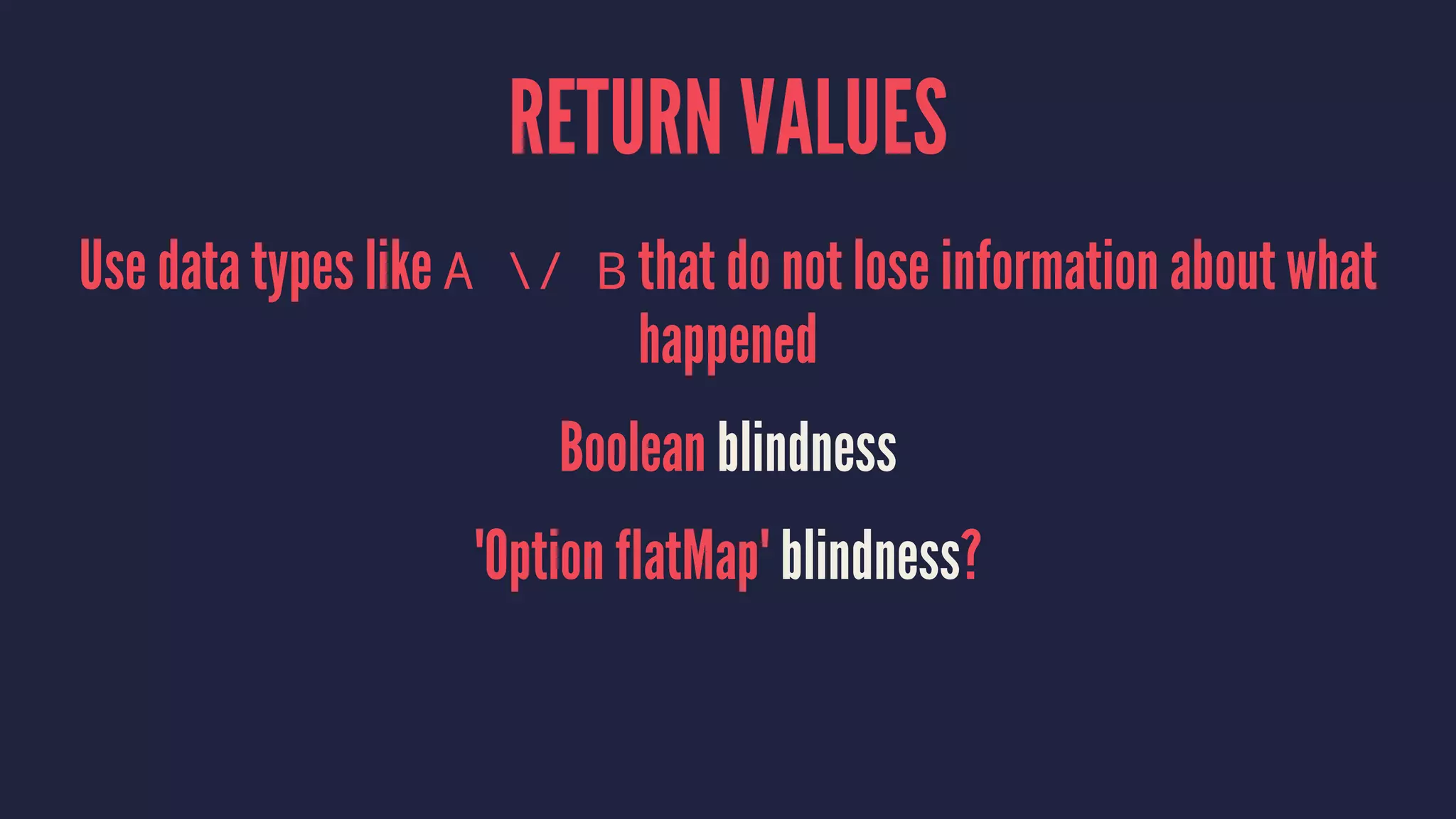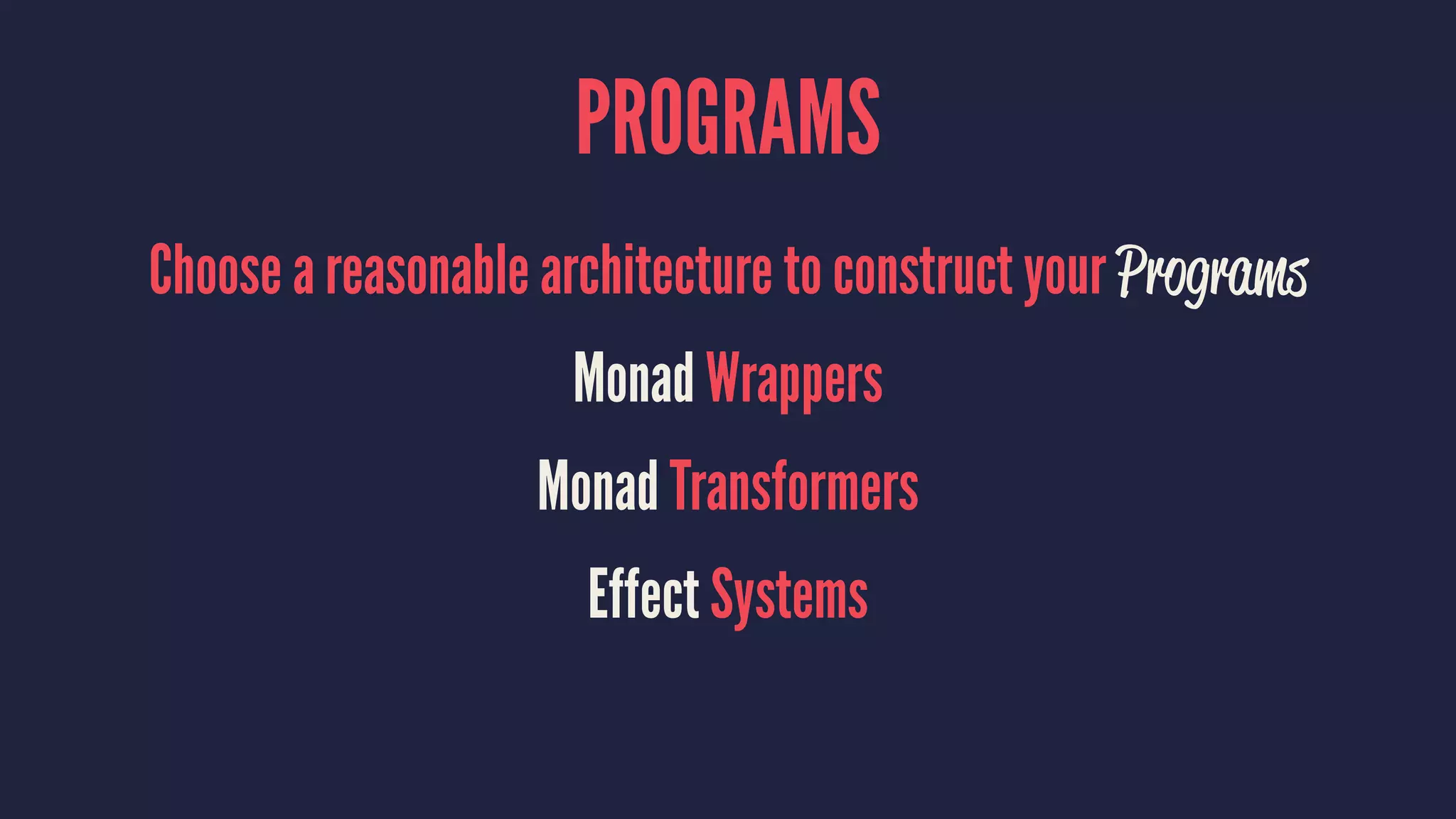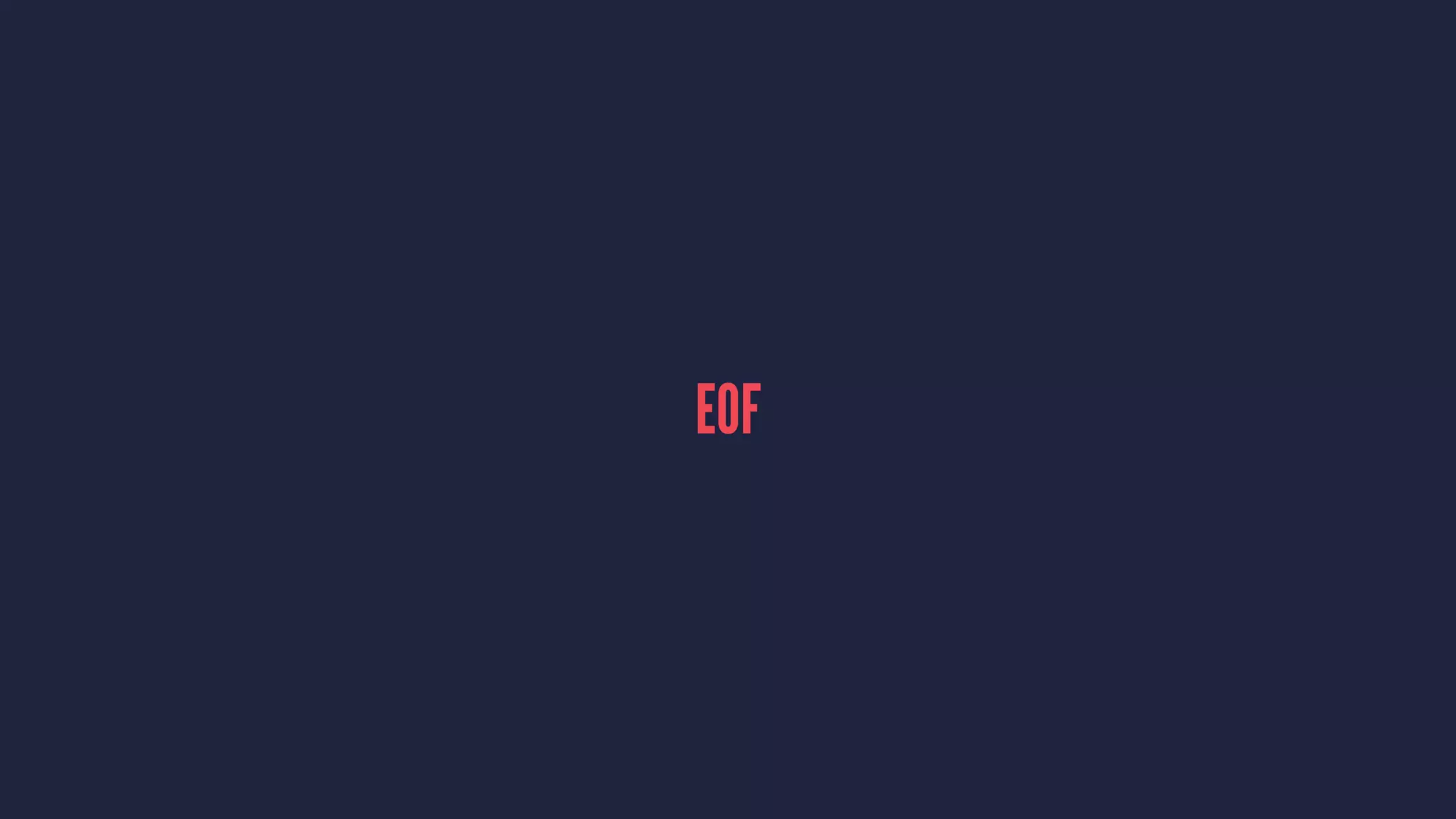The document discusses concepts related to functional programming in Scala, focusing on the use of types, effects, and monads for constructing and running programs. It covers various aspects of error handling using Scalaz and Cats libraries, emphasizing the importance of preserving information and avoiding 'boolean blindness.' Additionally, it elaborates on creating monad transformers and the concept of separating errors from results within a functional architecture.
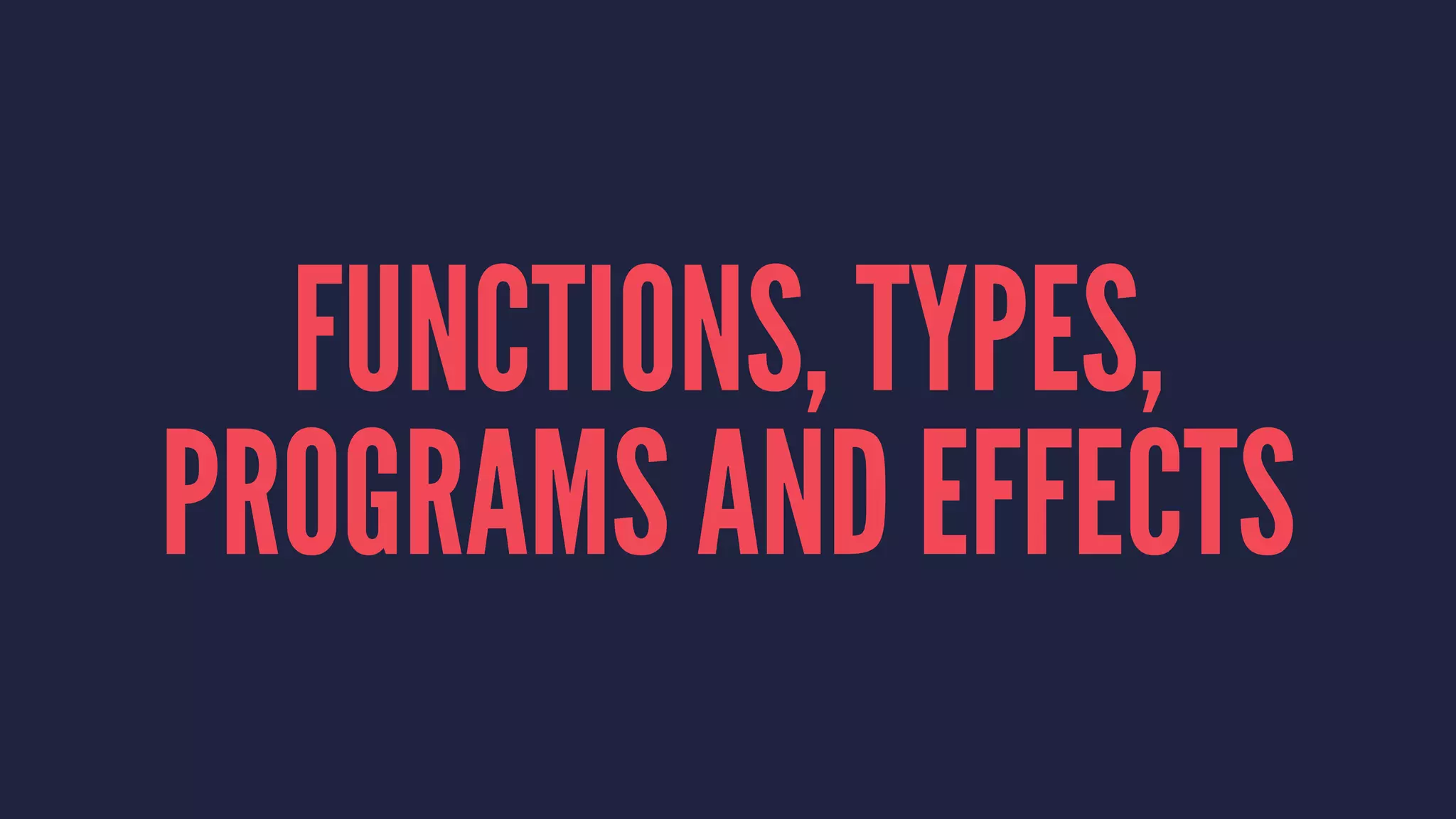

![A => B
A => Option[B]](https://image.slidesharecdn.com/brabant-160713130544/75/Functions-Types-Programs-and-Effects-3-2048.jpg)
![Either[A,B]](https://image.slidesharecdn.com/brabant-160713130544/75/Functions-Types-Programs-and-Effects-4-2048.jpg)

![A => M[A]](https://image.slidesharecdn.com/brabant-160713130544/75/Functions-Types-Programs-and-Effects-6-2048.jpg)
![scala.concurrent.Future[+A]](https://image.slidesharecdn.com/brabant-160713130544/75/Functions-Types-Programs-and-Effects-7-2048.jpg)
![scalaz.concurrent.Task[+A]](https://image.slidesharecdn.com/brabant-160713130544/75/Functions-Types-Programs-and-Effects-8-2048.jpg)

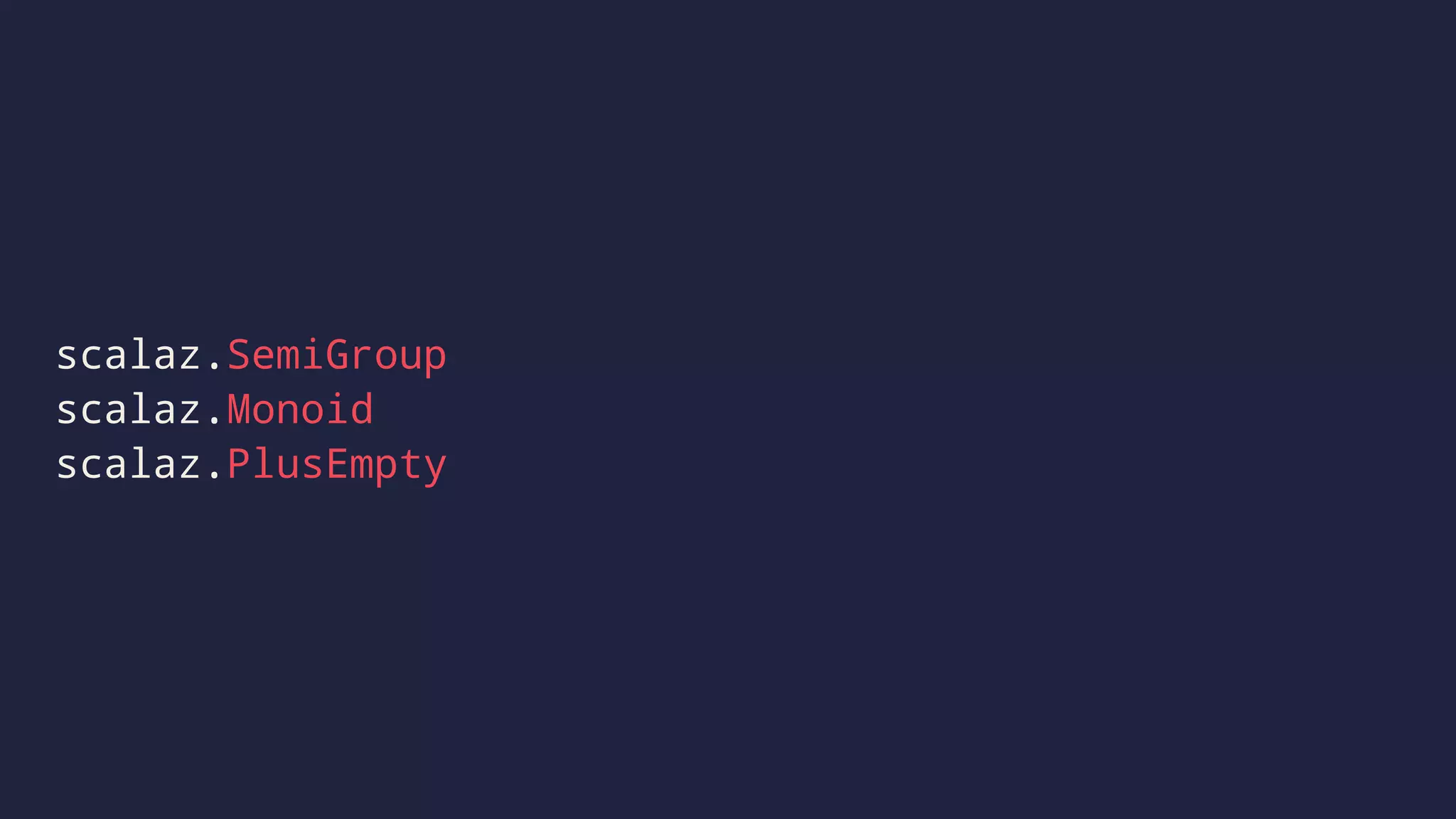


![Does SI-2712 ring a bell?
scalaz.Unapply[TC[_[_]], MA]
traverseU](https://image.slidesharecdn.com/brabant-160713130544/75/Functions-Types-Programs-and-Effects-13-2048.jpg)
![EitherT[F[_], A, B]
OptionT[F[_], A]](https://image.slidesharecdn.com/brabant-160713130544/75/Functions-Types-Programs-and-Effects-14-2048.jpg)
![What's this all about?
type E = Task |: (String / ?) |: Option |: Base
type Stack = ReaderInt |: WriterString |: Eval |: NoEffect
type PRG[A] = (Log.DSL :@: DB.DSL :@: FXNil)#Cop[A]
Free[PRG, Xor[DBError, Entity]]](https://image.slidesharecdn.com/brabant-160713130544/75/Functions-Types-Programs-and-Effects-15-2048.jpg)


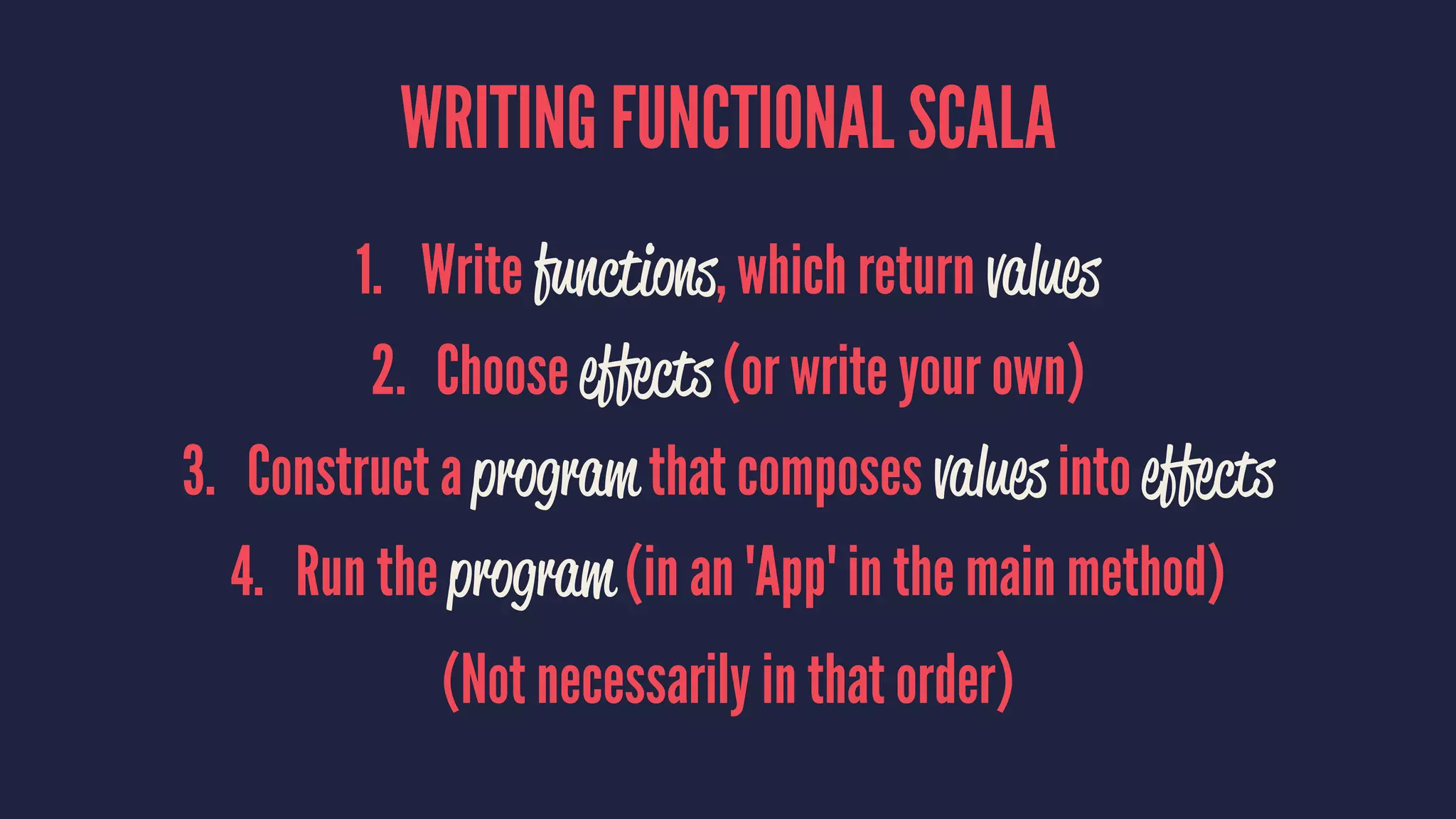
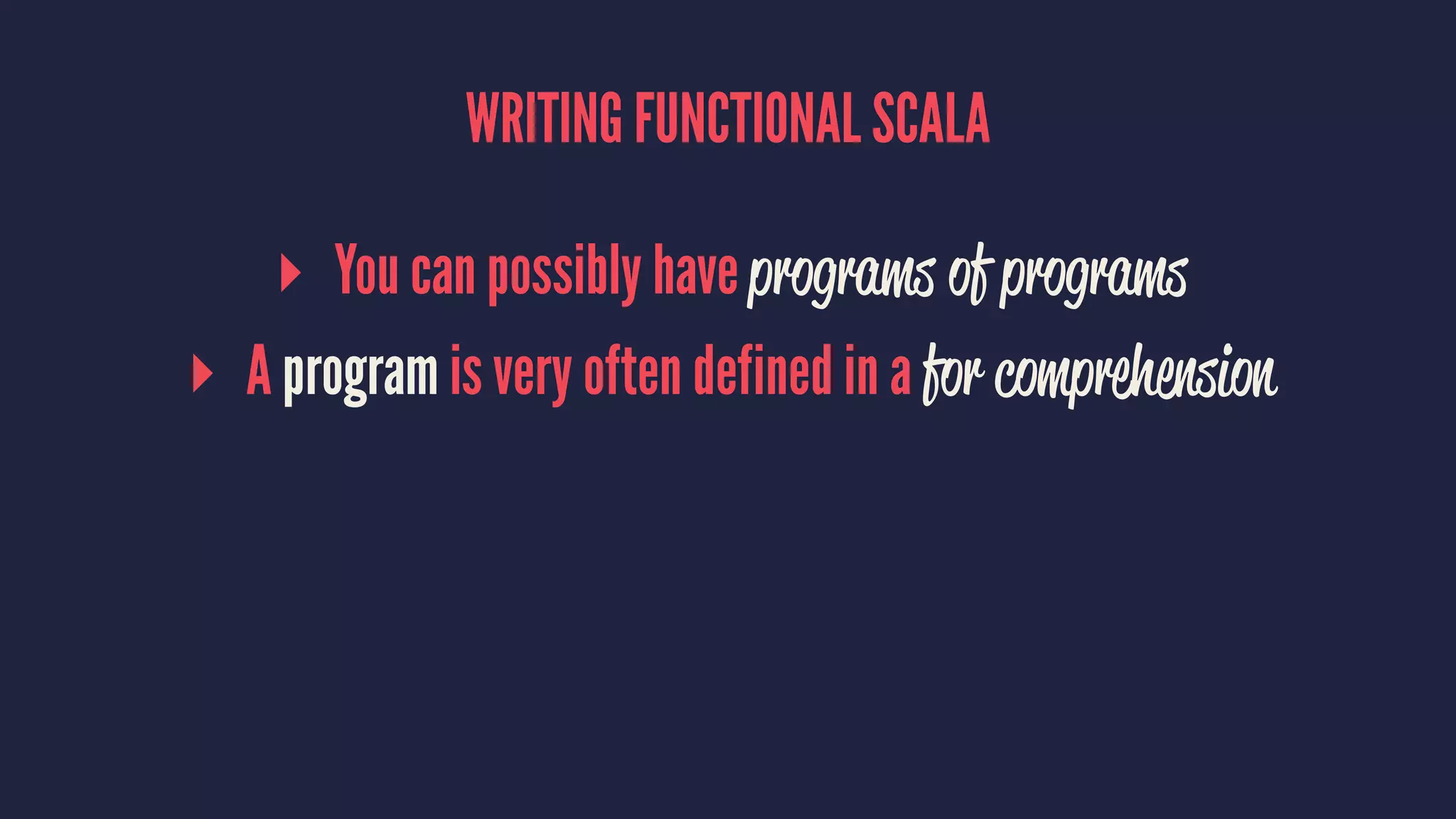
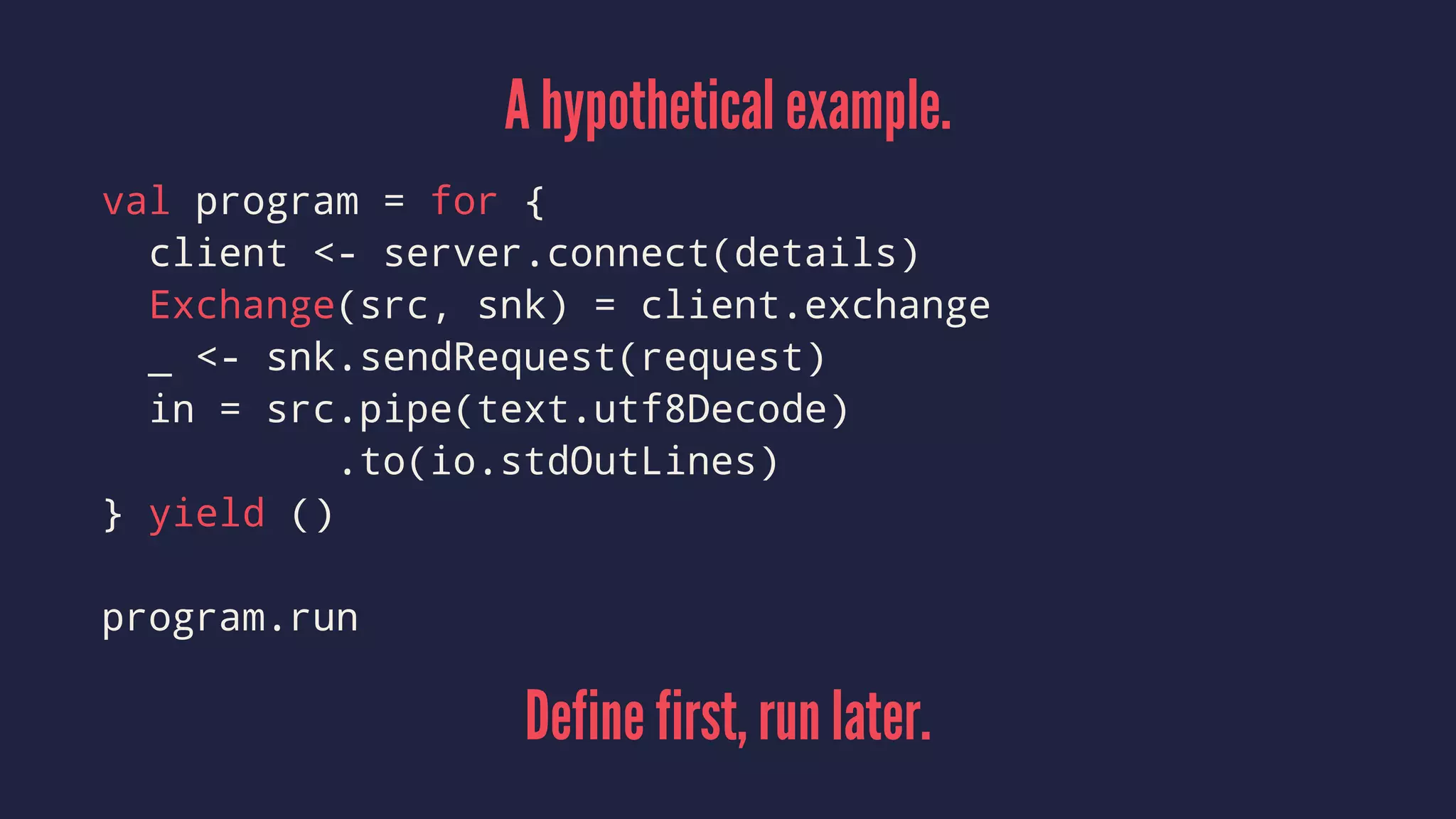
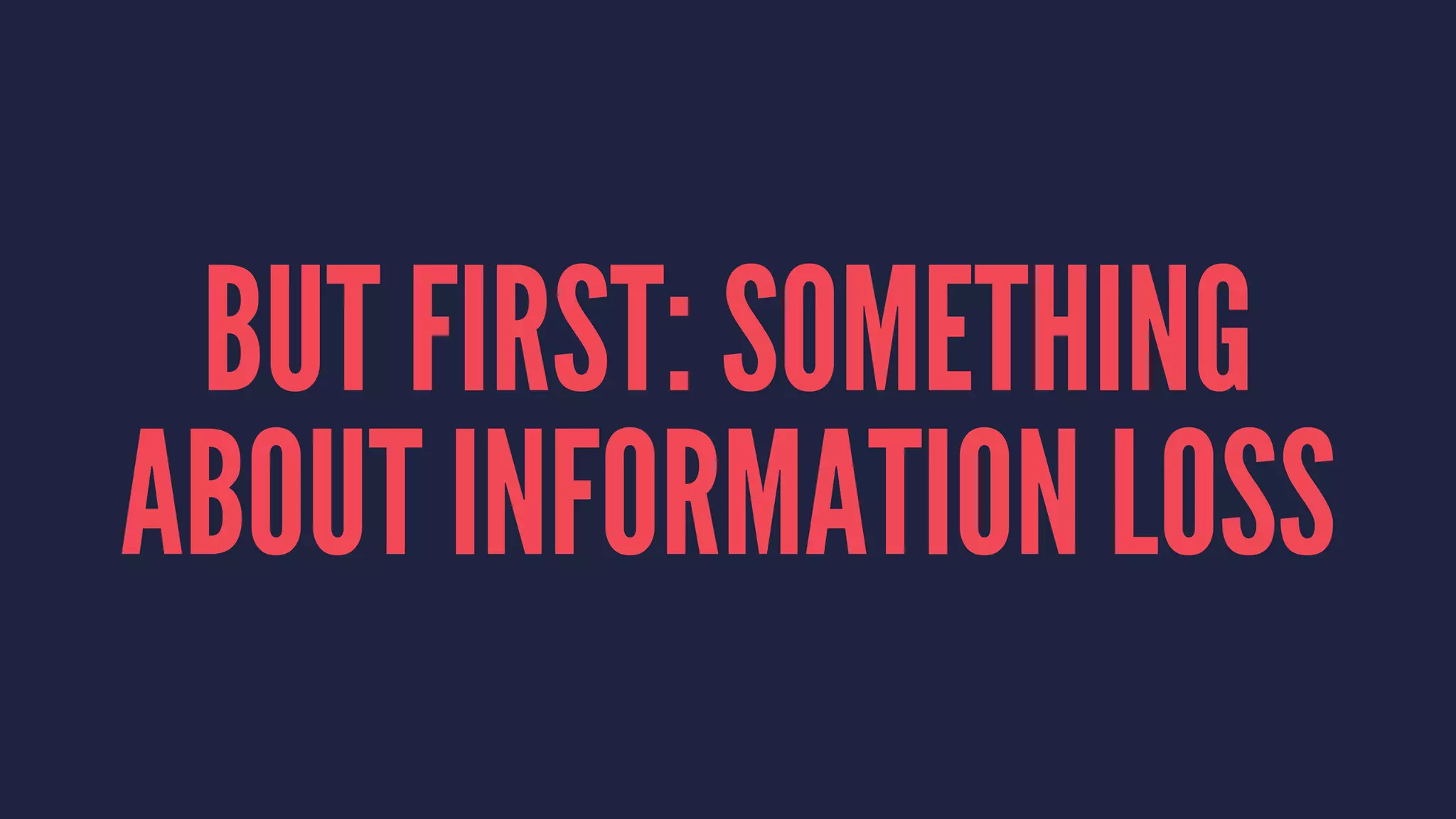
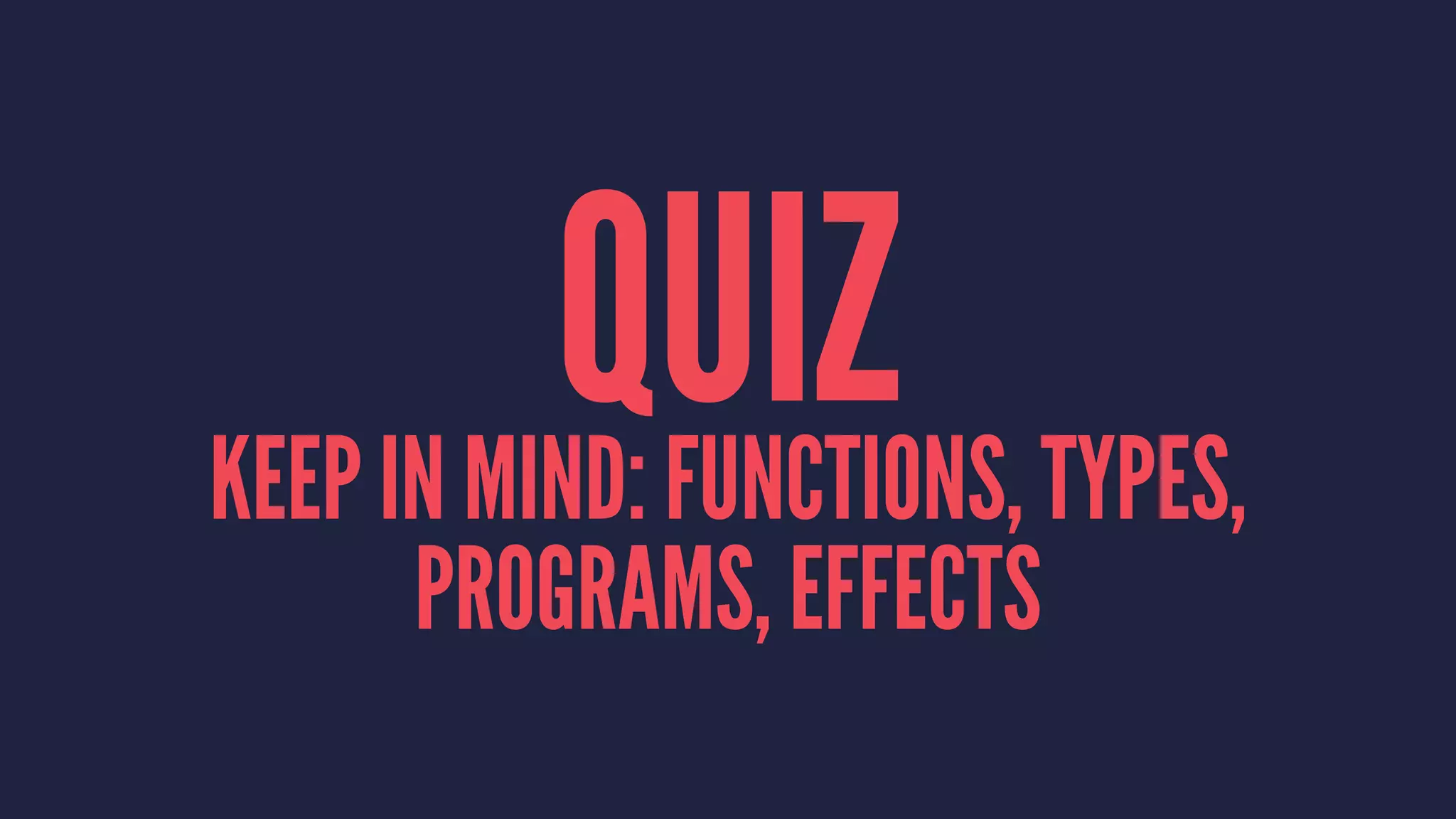
![Anything 'wrong' with these methods / functions?
def getUser(username: Username): Future[User]
def createUser(details: UserDetails): Future[User]
def getPrimaryAccount(user: User): Future[Account]](https://image.slidesharecdn.com/brabant-160713130544/75/Functions-Types-Programs-and-Effects-23-2048.jpg)
![Anything 'wrong' with this?
def getUser(username: Username): Future[Option[User]]
def getAccounts(user: User): Future[List[Account]]
def approved(user: User, accounts: List[Account]): Future[Boolean]](https://image.slidesharecdn.com/brabant-160713130544/75/Functions-Types-Programs-and-Effects-24-2048.jpg)
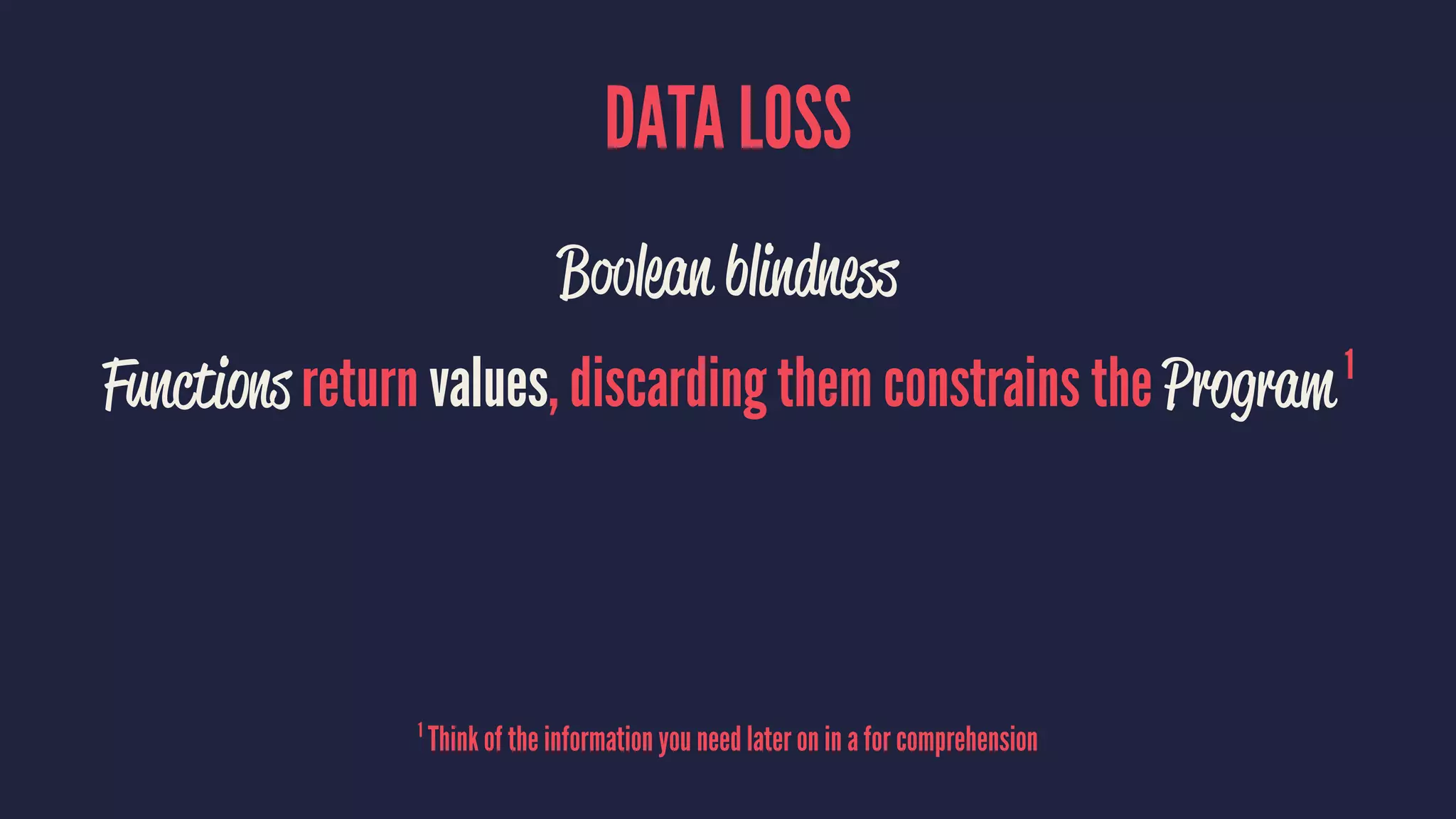
![What is 'wrong' with this?
sealed trait Error
case object UserNotFound extends Error
case object UserNameNotFound extends Error
case object AccountNotFound extends Error
def getUser(username: Username): Future[Either[Error, User]]
def getAccounts(user: User): Future[Either[Error, Account]]](https://image.slidesharecdn.com/brabant-160713130544/75/Functions-Types-Programs-and-Effects-26-2048.jpg)
![scalaz Disjunction (left or right)
val res: String / Int = /-(5)
val res1: String / Int = 5.right
val moreVerbose: String / Int = 5.right[String]
val res2: String / Int = "Some error".left
val friendlier = res2.leftMap(error => s"$error has occured, we apologize.")
val res3 = res1.map(five => five * 2) // /-(10)
Map over the right](https://image.slidesharecdn.com/brabant-160713130544/75/Functions-Types-Programs-and-Effects-27-2048.jpg)
![From Throwable to /
/.fromTryCatchThrowable[String, Exception] {
getDangerousString()
} // returns a Exception / String
/.fromTryCatchThrowable[String, Exception] {
getDangerousString()
}.leftMap(e=> MyError(e)) // returns a MyError / String](https://image.slidesharecdn.com/brabant-160713130544/75/Functions-Types-Programs-and-Effects-28-2048.jpg)
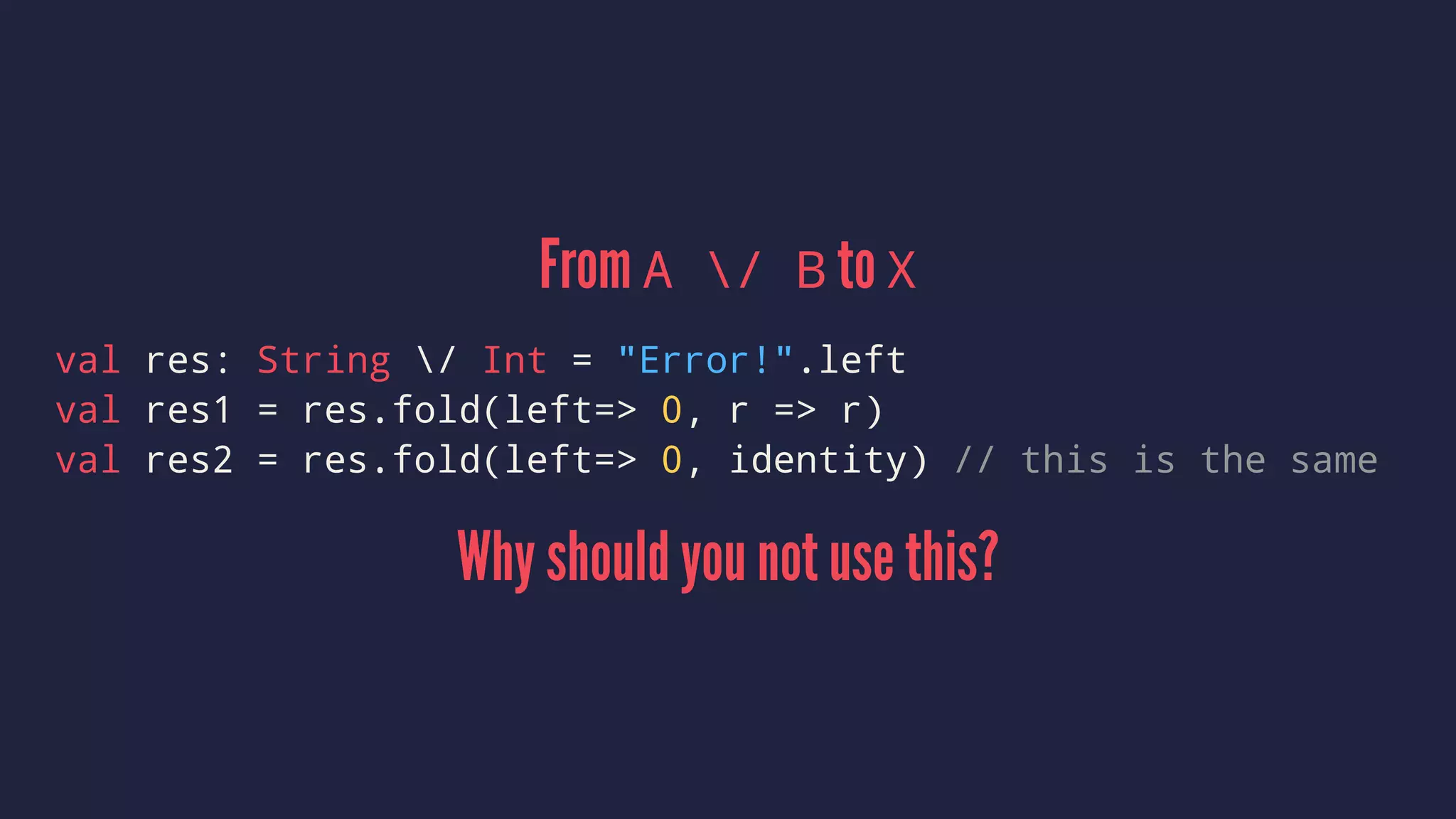
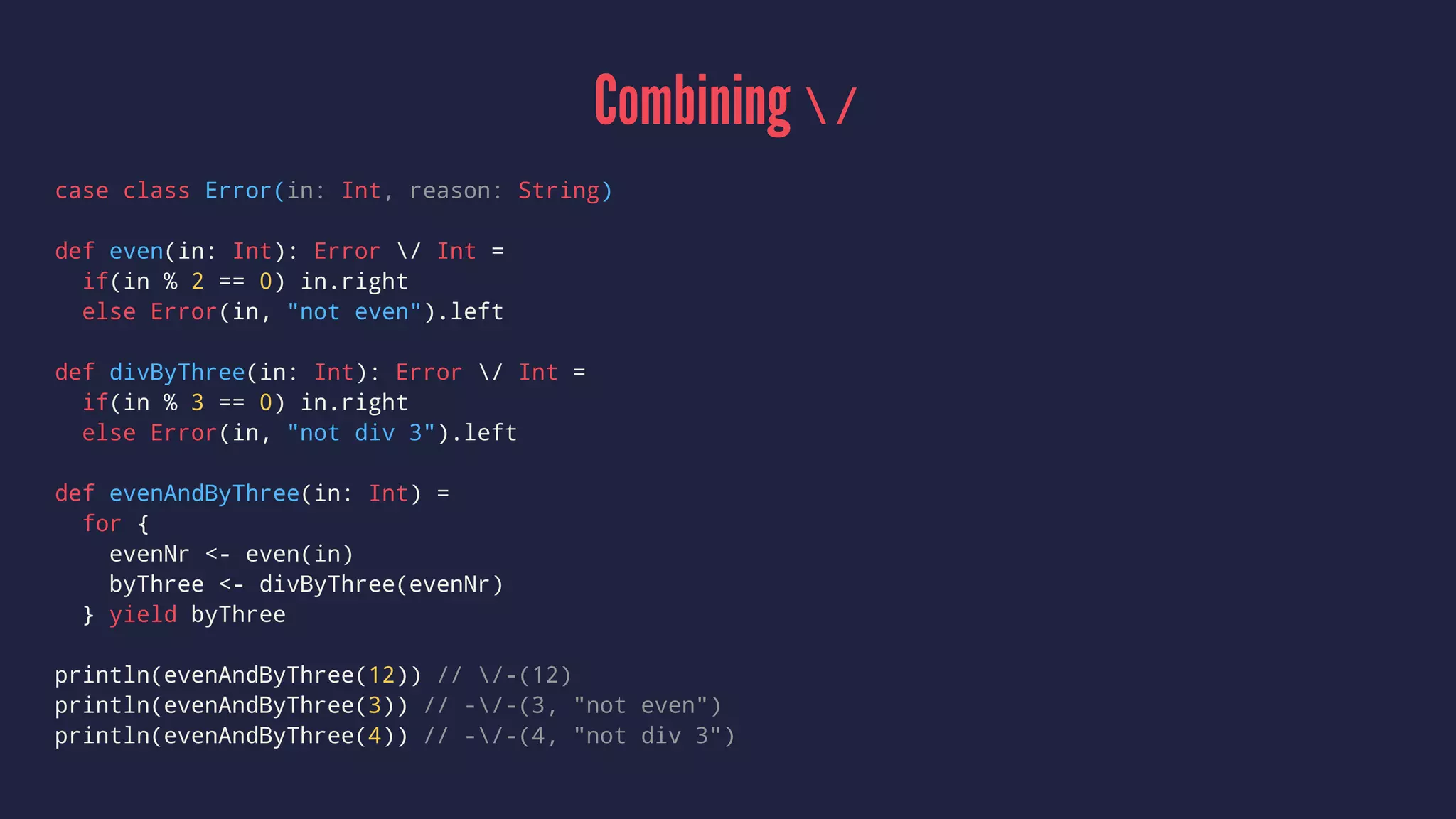
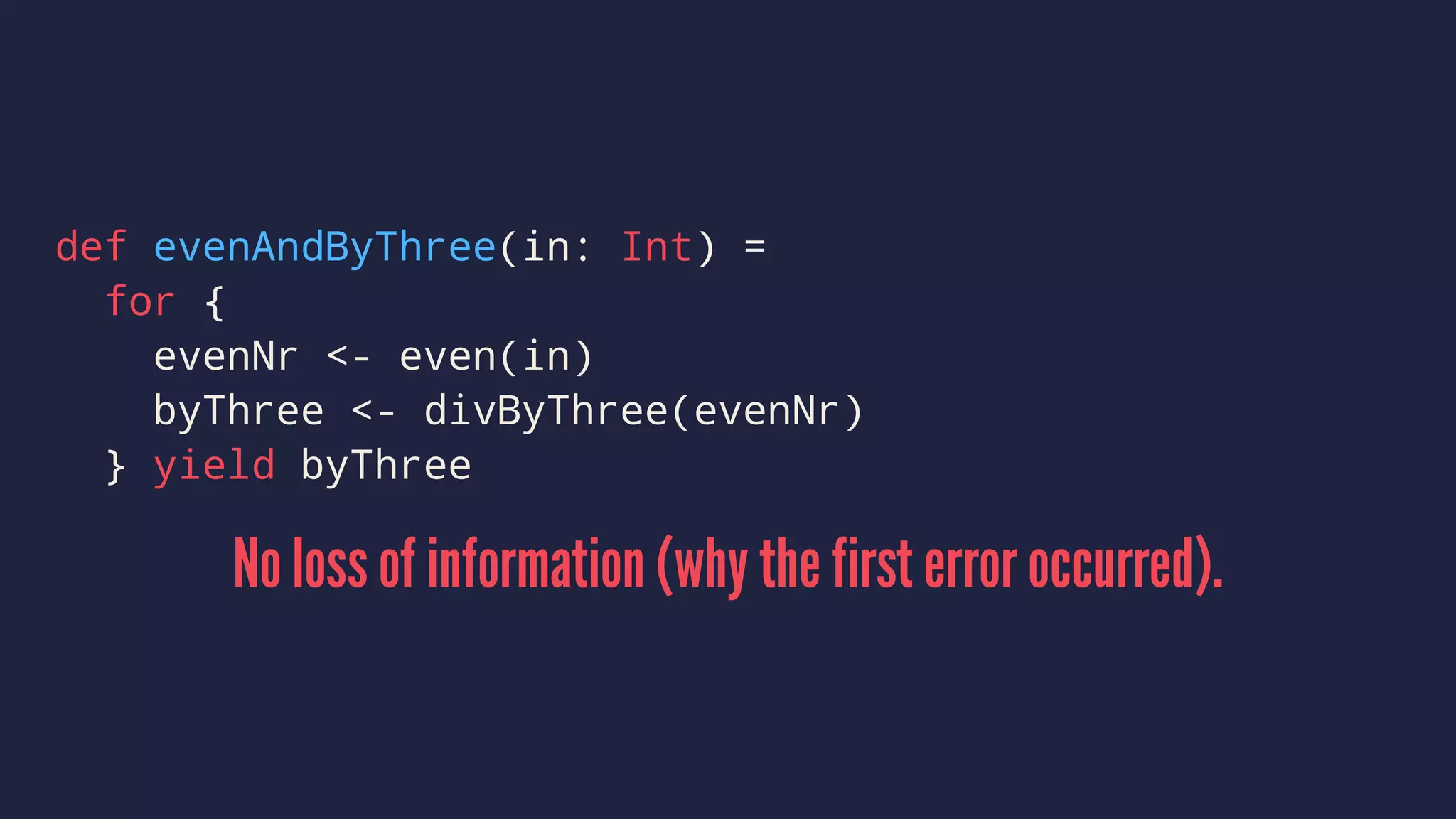
![Given
def getUser(username: Username): Future[Error / User]]
def getAccounts(user: User): Future[Error / List[Account]]
Does this compile?
val result = for {
user <- getUser(name)
accounts <- getAccounts(user)
} yield accounts](https://image.slidesharecdn.com/brabant-160713130544/75/Functions-Types-Programs-and-Effects-32-2048.jpg)
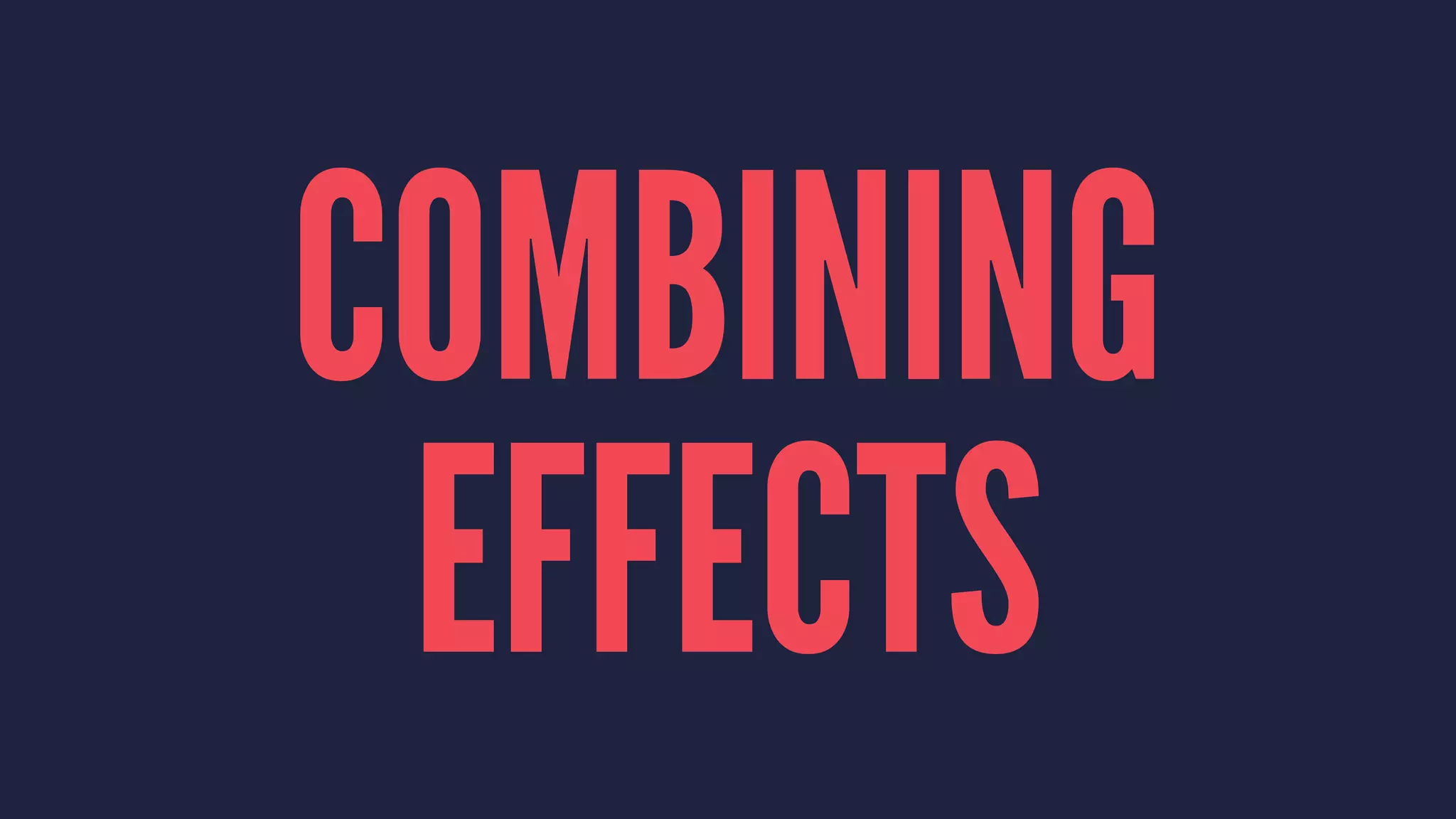
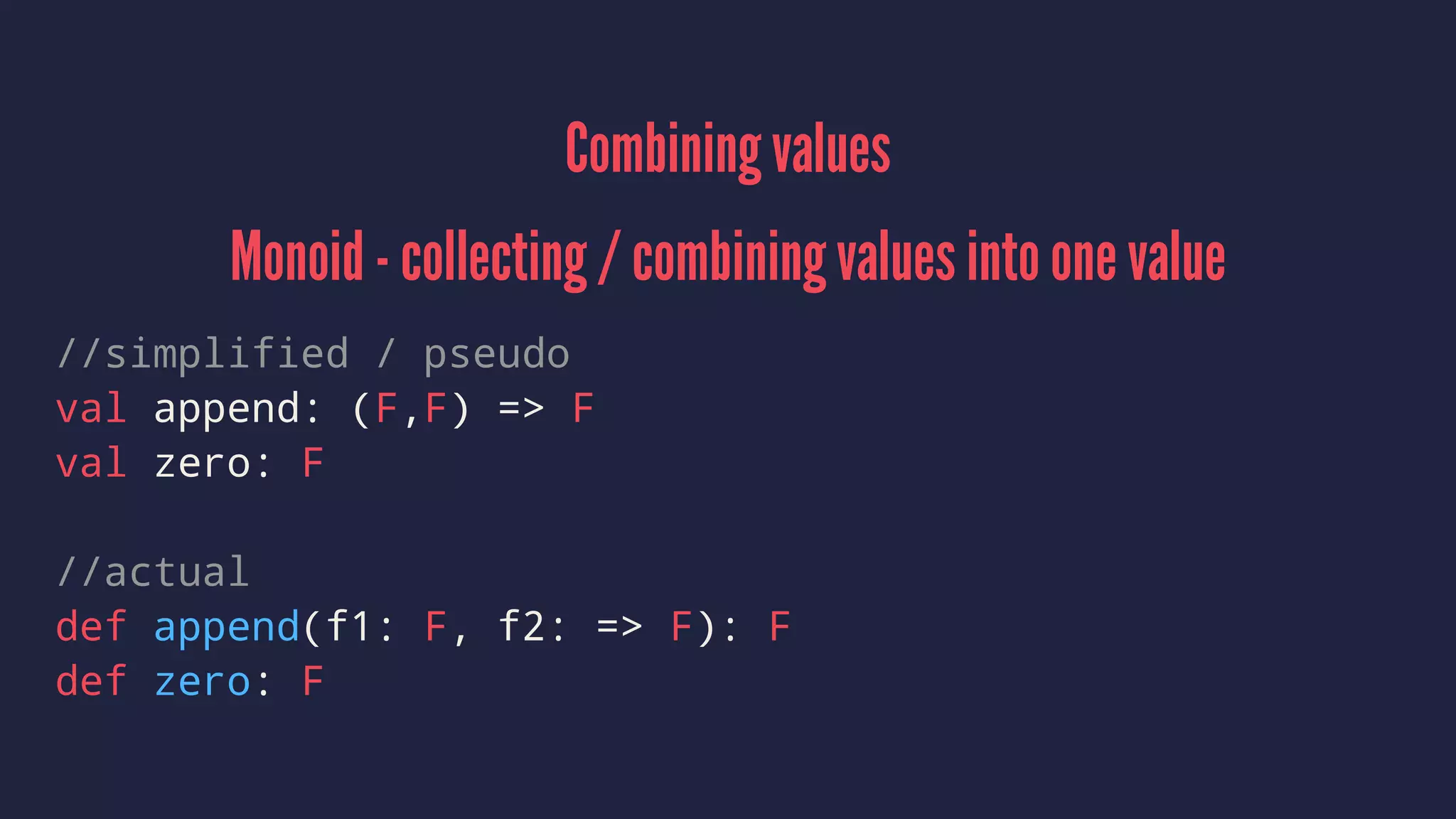
: F[A] // Creates an 'effects collector'
def bind[A, B](fa: F[A])(f: A => F[B]): F[B] // adds an effect
def map[A,B](fa: F[A])(f: A => B):F[B] // transforms input for next effect
Can only combine for same type of F.2
2
The Monad is a monoid in the category of endofunctors joke](https://image.slidesharecdn.com/brabant-160713130544/75/Functions-Types-Programs-and-Effects-35-2048.jpg)
 = F.bind(self)(f)
flatMap ~= bind](https://image.slidesharecdn.com/brabant-160713130544/75/Functions-Types-Programs-and-Effects-36-2048.jpg)
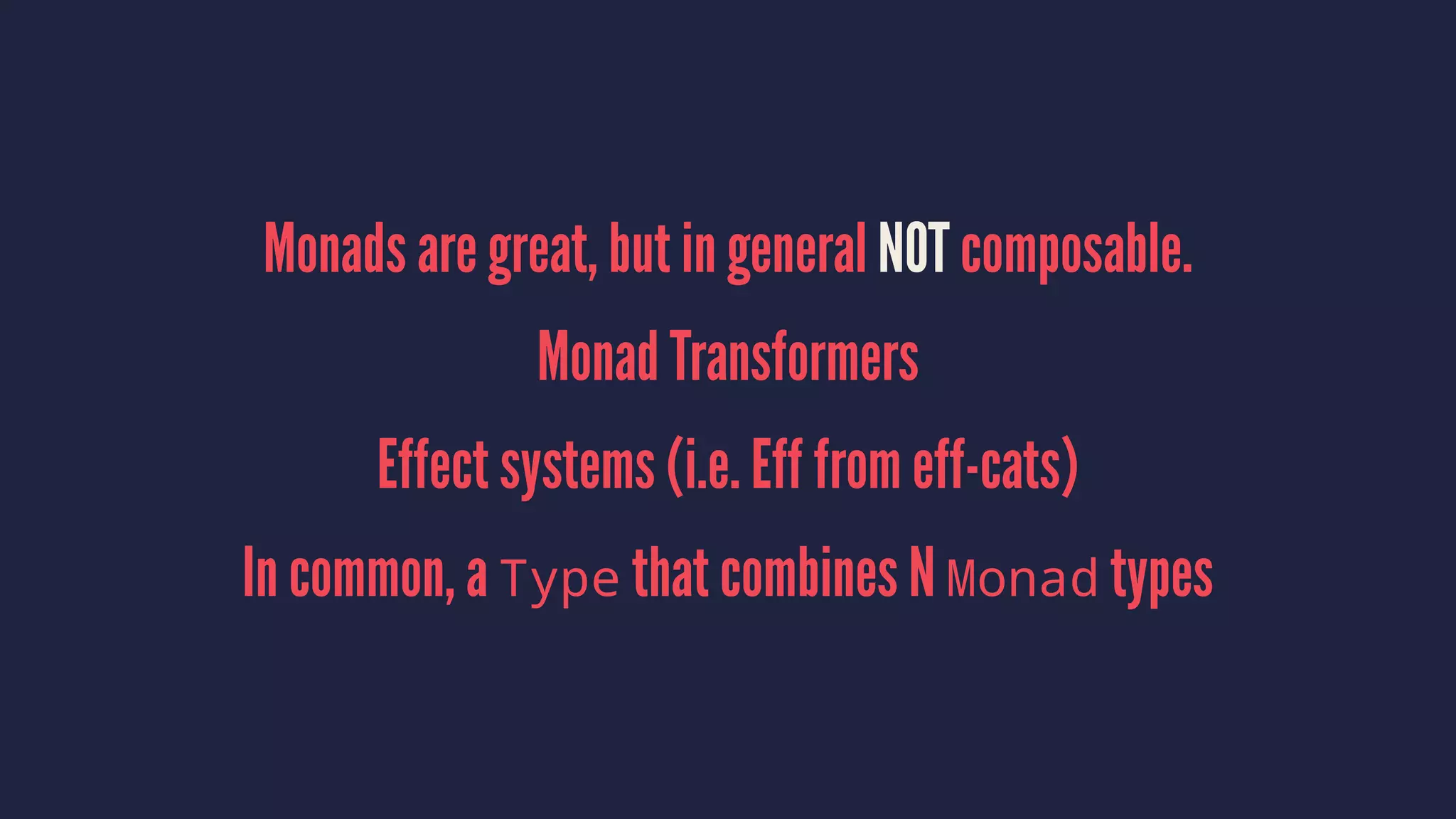
![Monad Transformer EitherT
val res = for {
user <- EitherT(getUser("bla"))
accounts <- EitherT(getAccounts(user))
} yield accounts // returns EitherT[Future, Error, List[Account]]
res.run // Future[Error / List[Account]]
Scalaz provides Future Monad instance in scalaz.std.scalaFuture](https://image.slidesharecdn.com/brabant-160713130544/75/Functions-Types-Programs-and-Effects-38-2048.jpg)
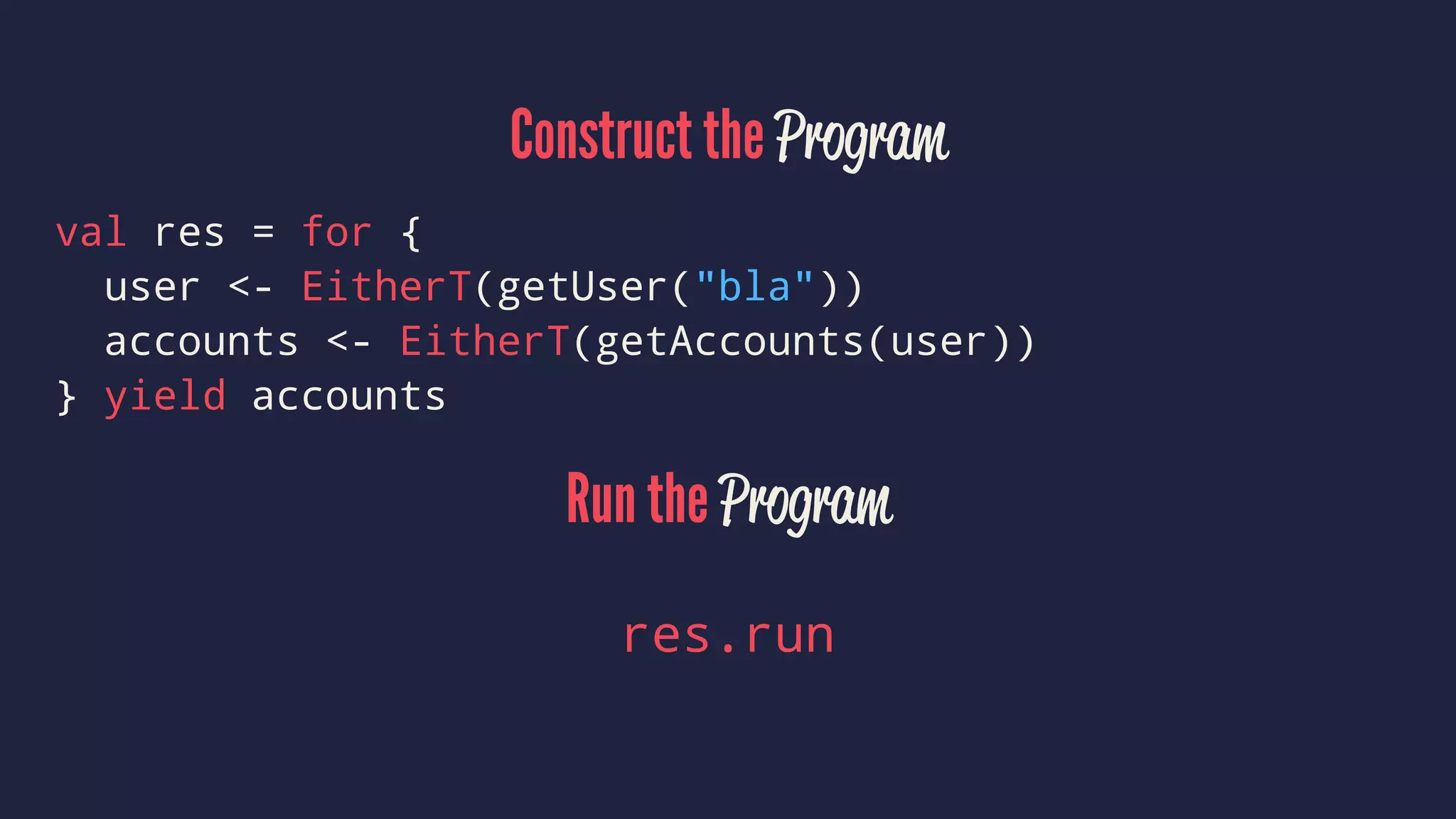

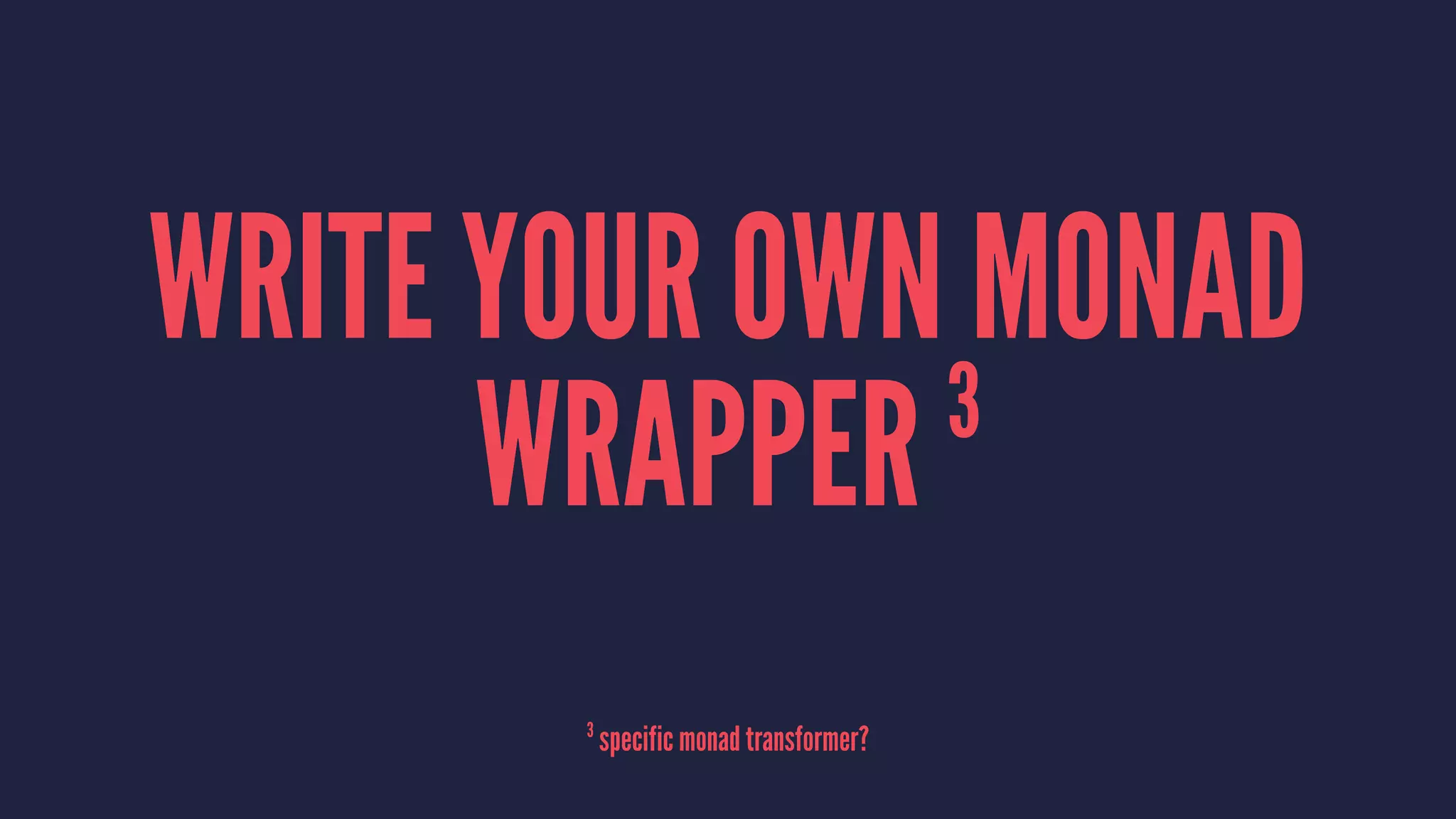
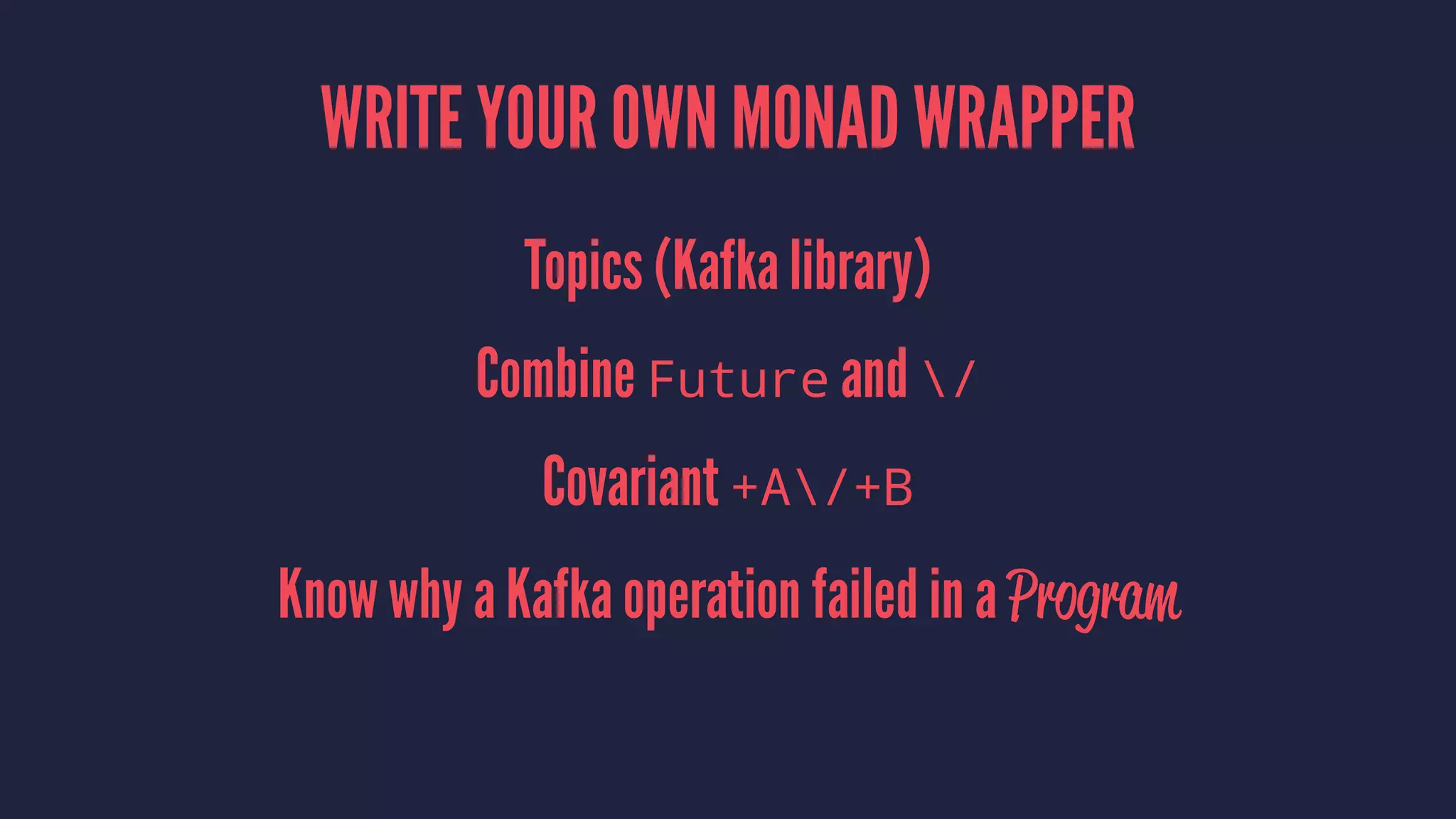
![Why not EitherT?
final case class EitherT[F[_], A, B](run: F[A / B])
Invariant in A,B](https://image.slidesharecdn.com/brabant-160713130544/75/Functions-Types-Programs-and-Effects-43-2048.jpg)
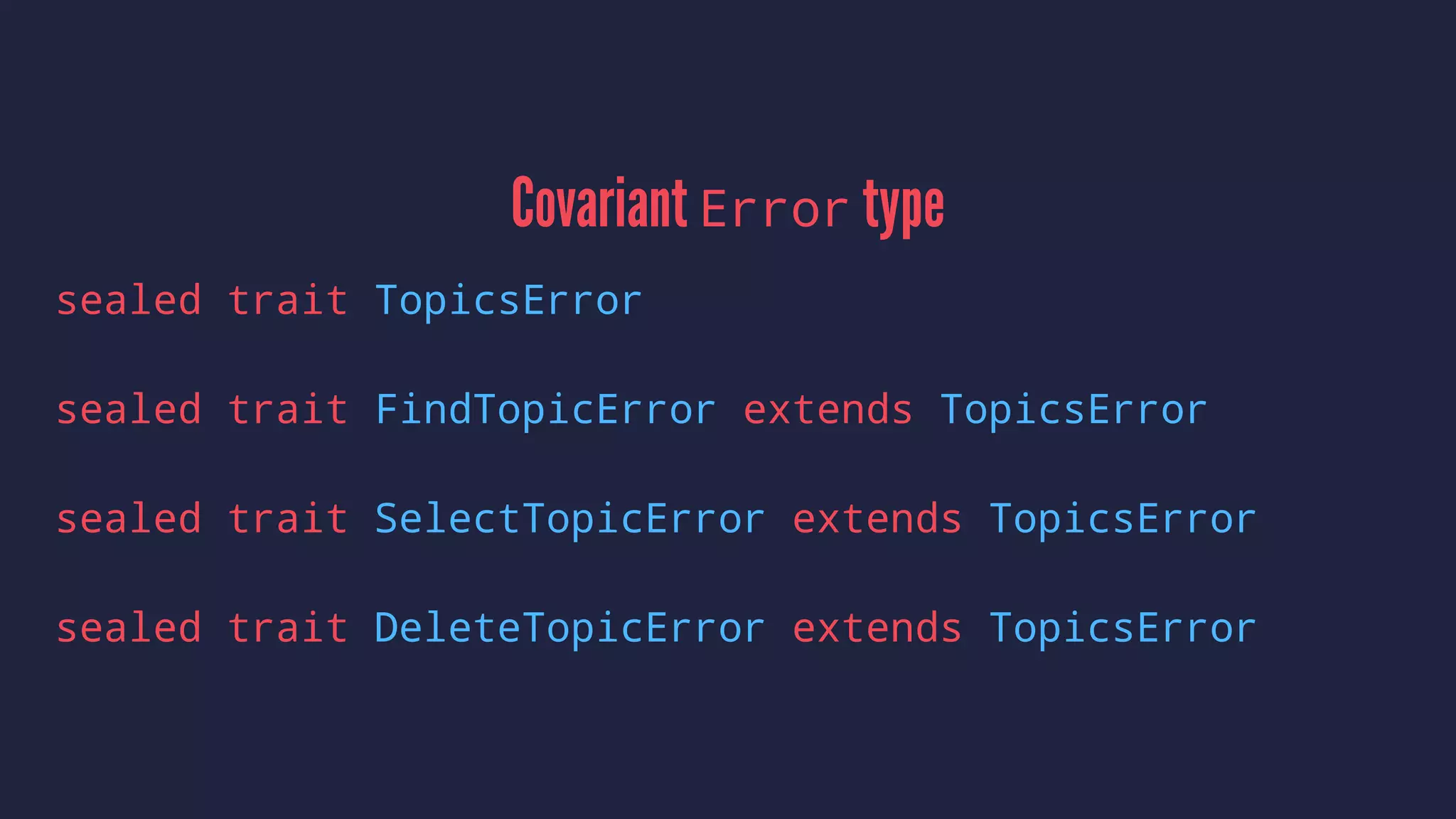
![Example program
val program: Topics[TopicsError, Chunk[String, String]] = for {
partition ← Topics.partitioned[String, String](topicDef, partitionId)
info ← partition.write(record)
chunk ← partition.read(info.offset, info.offset)
} yield chunk
// ... somewhere later
program.run(broker, executionContext)](https://image.slidesharecdn.com/brabant-160713130544/75/Functions-Types-Programs-and-Effects-45-2048.jpg)
![Minor detour (type lambda)
Monad[{ type λ[α] = Topics[E, α] })#λ]
~=
type MyMonad[T] = Monad[Topics[E, T]]
only inline.](https://image.slidesharecdn.com/brabant-160713130544/75/Functions-Types-Programs-and-Effects-46-2048.jpg)
![Roll your own Monad instance (Scalaz)
object Topics {
implicit def topicsMonad[E] = new Monad[({ type λ[α] = Topics[E, α] })#λ] {
def point[T](value: T): Topics[E, T] = Topics.point(value)
def bind[T, U](topics: Topics[E, T])(f: T Topics[E, U]): Topics[E, U] = topics.flatMap(f)
}
}
delegate to point and flatMap](https://image.slidesharecdn.com/brabant-160713130544/75/Functions-Types-Programs-and-Effects-47-2048.jpg)
 Future[E / T]) {
// more to follow](https://image.slidesharecdn.com/brabant-160713130544/75/Functions-Types-Programs-and-Effects-48-2048.jpg)
 Future[E / T]) {
def map[C](f: T C): Topics[E, C] =
Topics((broker, ec) run(broker, ec).map(_.map(f))(ec))
def flatMap[E1 >: E, C](f: T Topics[E1, C]): Topics[E1, C] =
Topics { (broker, ec)
run(broker, ec).flatMap(
_.fold(err Future.successful(-/(err)), res f(res).run(broker, ec))
)(ec)
}
}](https://image.slidesharecdn.com/brabant-160713130544/75/Functions-Types-Programs-and-Effects-49-2048.jpg)
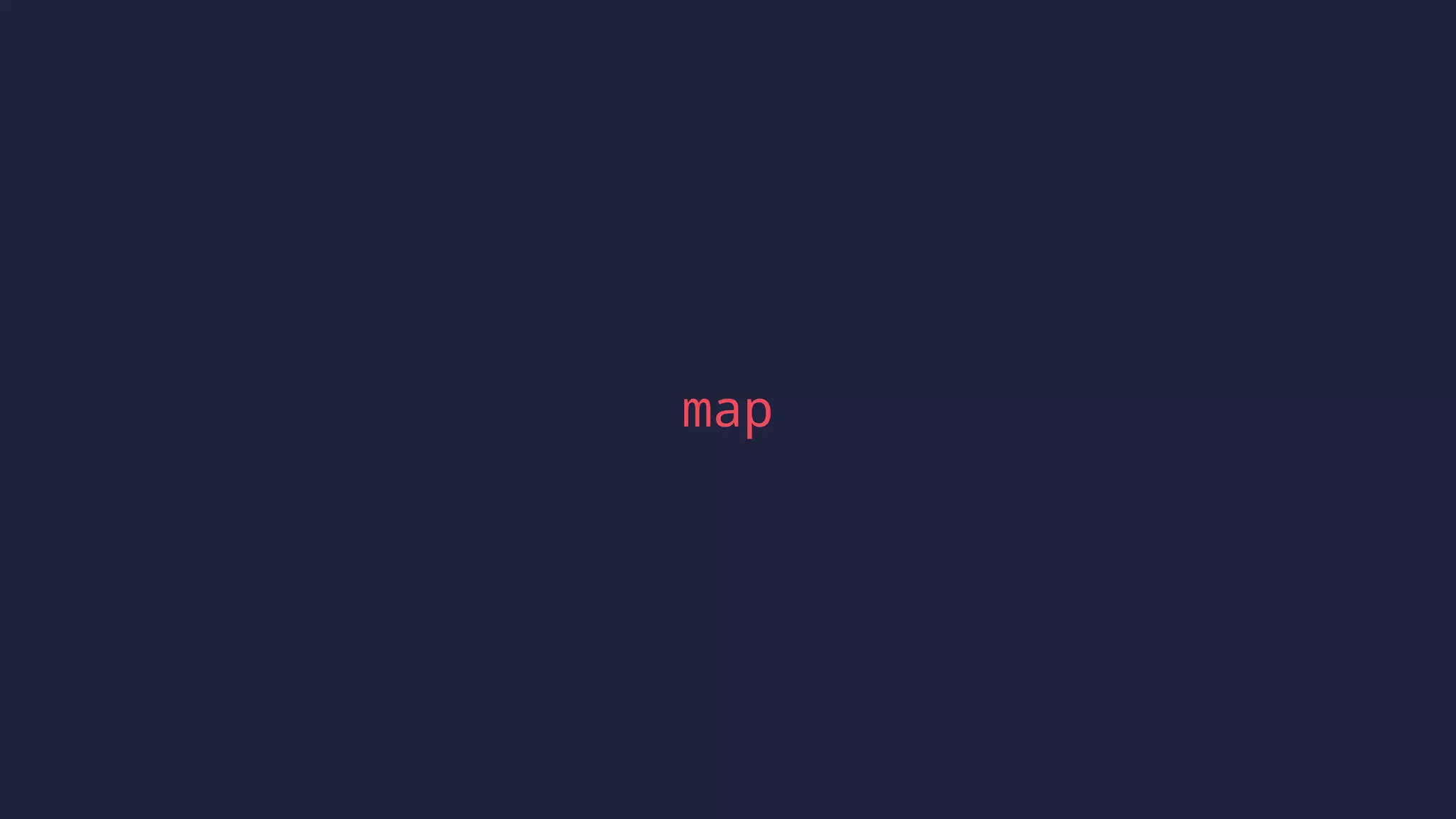
 Future[E / T]) {
def map[C](f: T C): Topics[E, C] =
Topics((broker, ec) run(broker, ec).map(_.map(f))(ec))
zoom in
Topics((broker, ec) run(broker, ec).map(_.map(f))(ec))
zoom in
run(broker, ec).map(_.map(f))](https://image.slidesharecdn.com/brabant-160713130544/75/Functions-Types-Programs-and-Effects-51-2048.jpg)
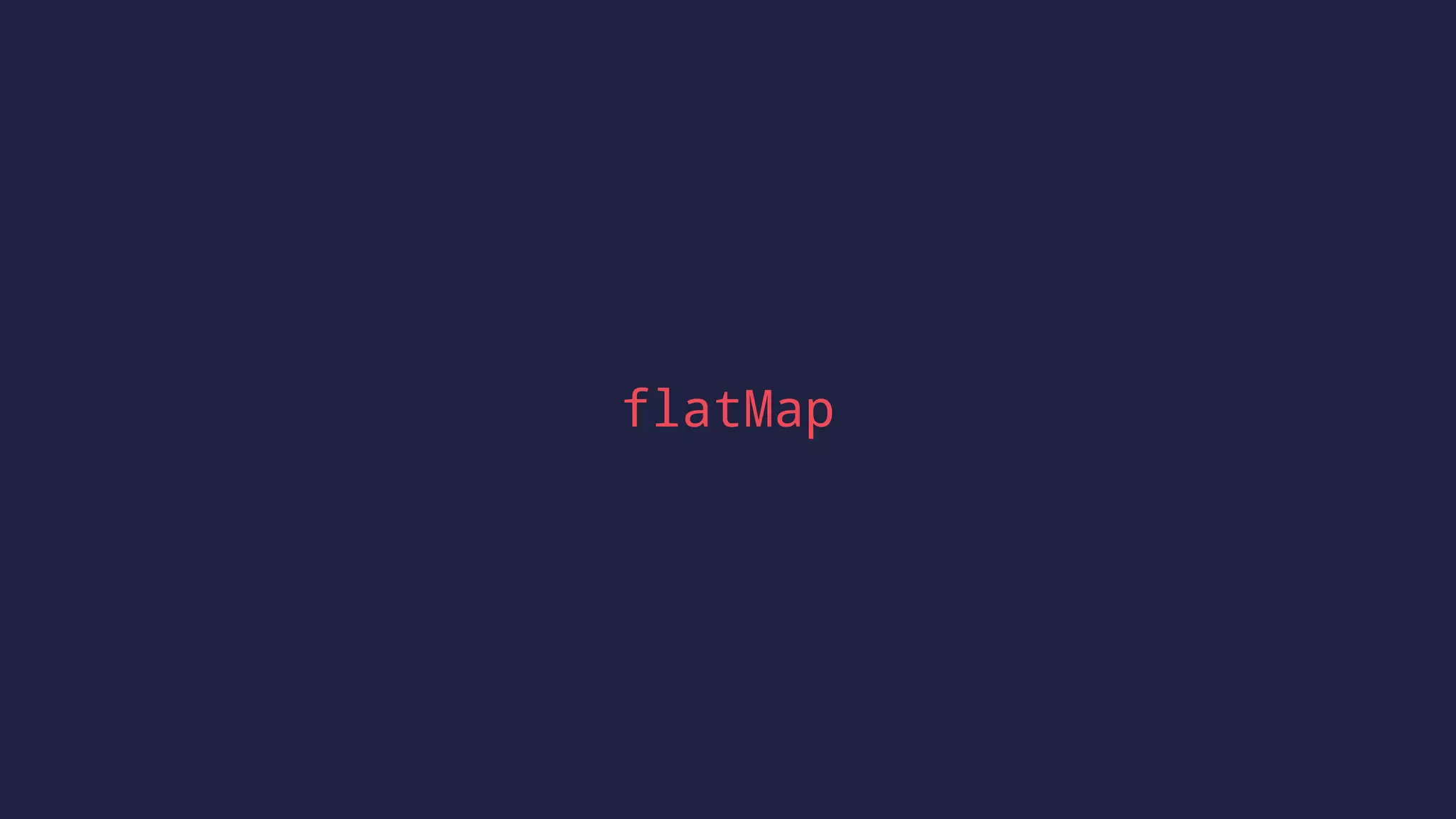

(implicit ec: ExecutionContext): Future[E / T] = action.run(broker, ec)
def point[T](value: T): Topics[Nothing, T] = Topics[Nothing, T]((broker, ec) Future.successful(value.right))
def future[T](action: Future[T]): Topics[Nothing, T] = Topics((broker, ec) action.map(_.right)(ec))
def futureF[T](action: ExecutionContext Future[T]): Topics[Nothing, T] = Topics((broker, ec) action(ec).map(_.right)(ec))
def either[E, T](either: E / T): Topics[E, T] = Topics((_, _) Future.successful(either))
def futureEither[E, T](action: Future[E / T]): Topics[E, T] = Topics((_, _) action)
def futureEitherF[E, T](action: ExecutionContext Future[E / T]): Topics[E, T] = Topics((_, ec) action(ec))
// ... more code
}](https://image.slidesharecdn.com/brabant-160713130544/75/Functions-Types-Programs-and-Effects-54-2048.jpg)

![import scalaz.scalacheck.ScalazProperties.monad
class MonadLawsSpec extends Spec {
def is = s2"""obey the monad laws $laws"""
def laws = {
implicit val b = broker
monad.laws[({ type l[a] = Topics[Int, a] })#l]
}
}](https://image.slidesharecdn.com/brabant-160713130544/75/Functions-Types-Programs-and-Effects-56-2048.jpg)

![case class Config(inputFile: Option[File], outputFile: Option[File])
def main(args: Array[String]): Unit = {
val config = parseArgs(args)
// ...
}](https://image.slidesharecdn.com/brabant-160713130544/75/Functions-Types-Programs-and-Effects-58-2048.jpg)
), "INPUT_FILE must be an existing file", _.isFile),
long("input-file"),
metavar("INPUT_FILE"),
short('f'),
help("input file to read from")
))
val outputFile = optional(opt[File](
readStr.map(str new File(str)),
long("output-file"),
metavar("OUTPUT_FILE"),
short('o'),
help("output file to write to")
))](https://image.slidesharecdn.com/brabant-160713130544/75/Functions-Types-Programs-and-Effects-59-2048.jpg)
![def parseArgs(args: Array[String]): Config = {
val inputFile = optional(opt[File]( // ... omitted
val outputFile = optional(opt[File]( // ... omitted
val parser = (input |@| inputFile)(Config.apply(_, _))
execParser(args, "copy", info(parser <*> helper,
header("The awesome copy utility.")
))
}](https://image.slidesharecdn.com/brabant-160713130544/75/Functions-Types-Programs-and-Effects-60-2048.jpg)
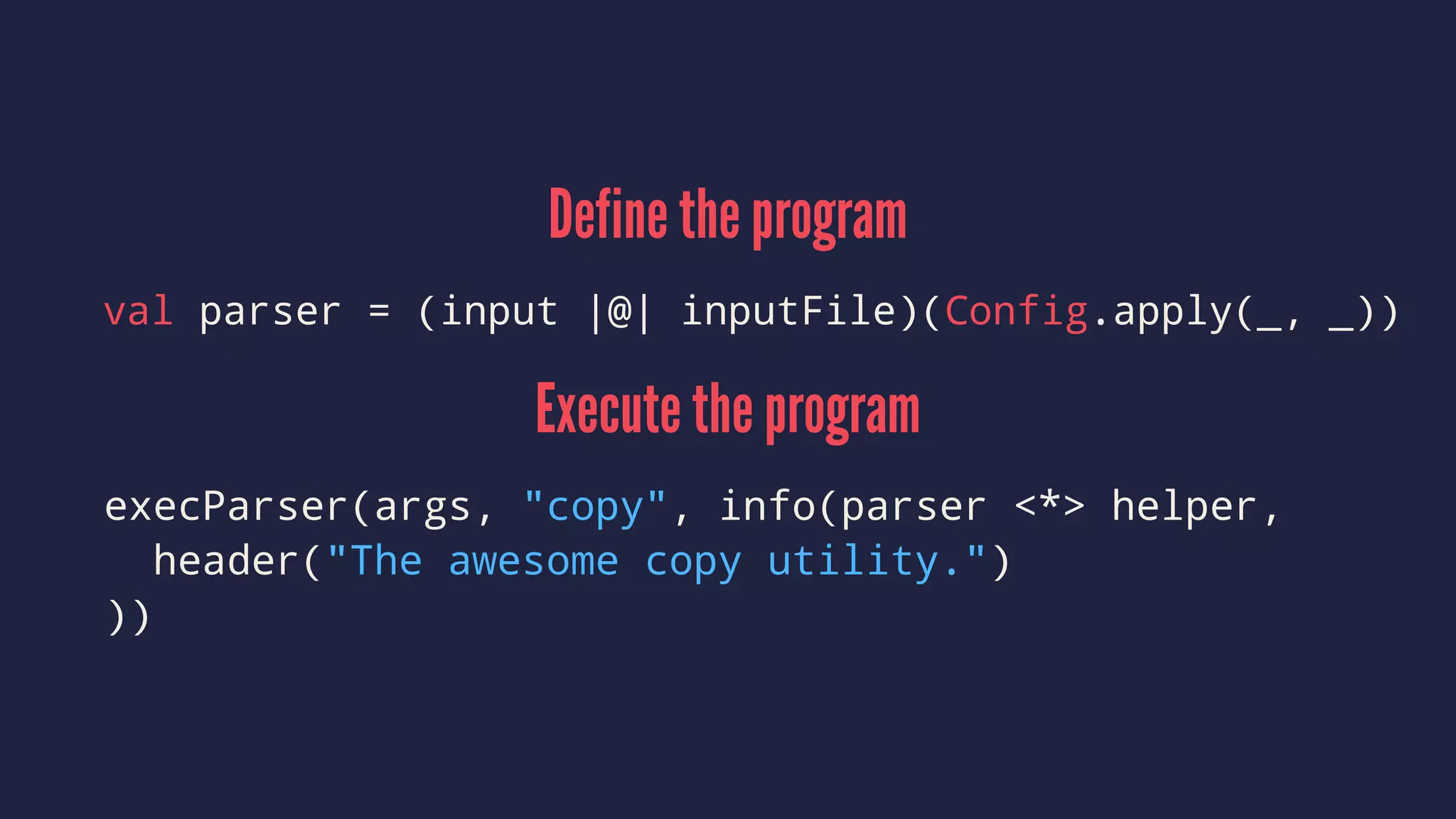

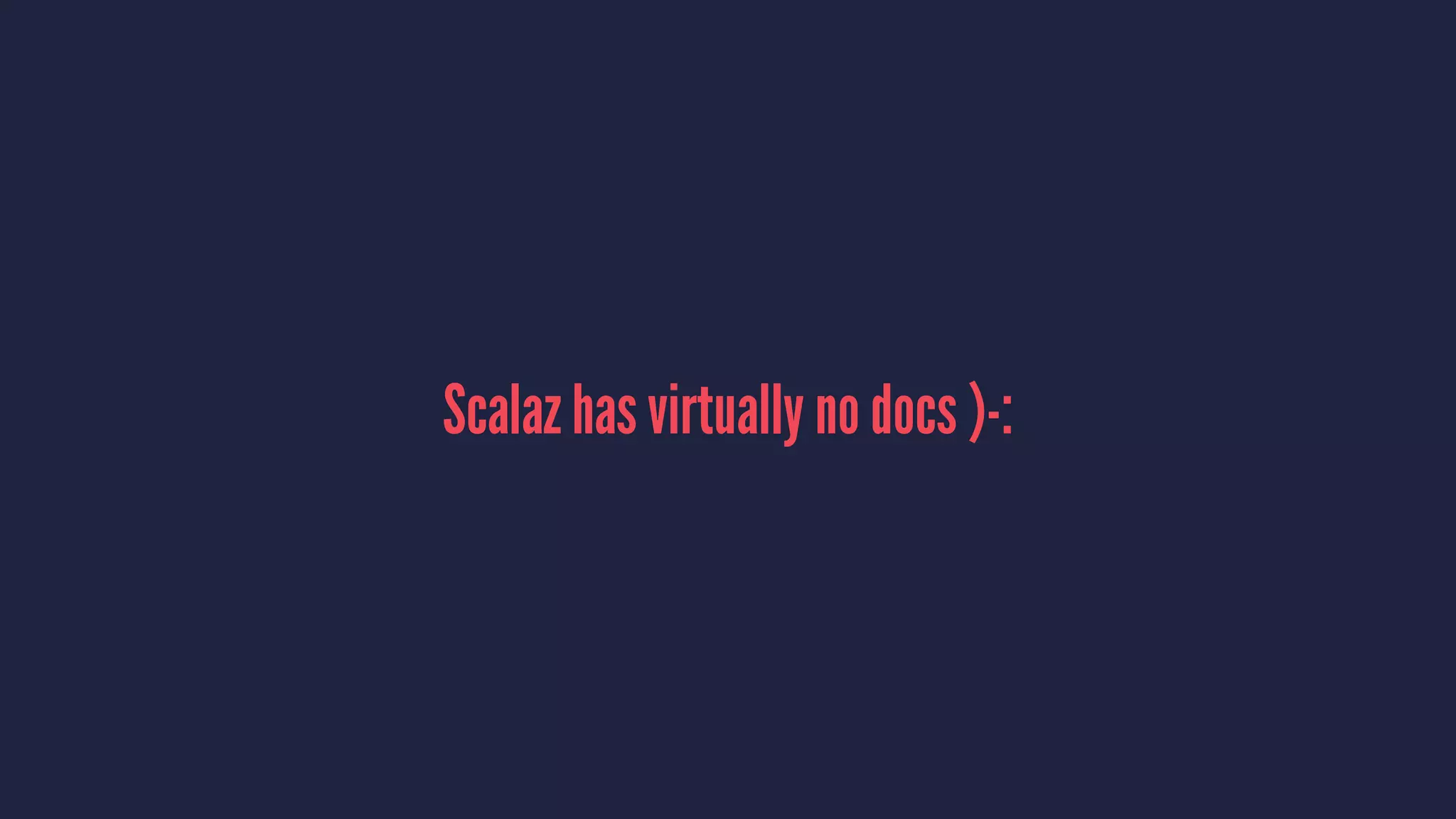
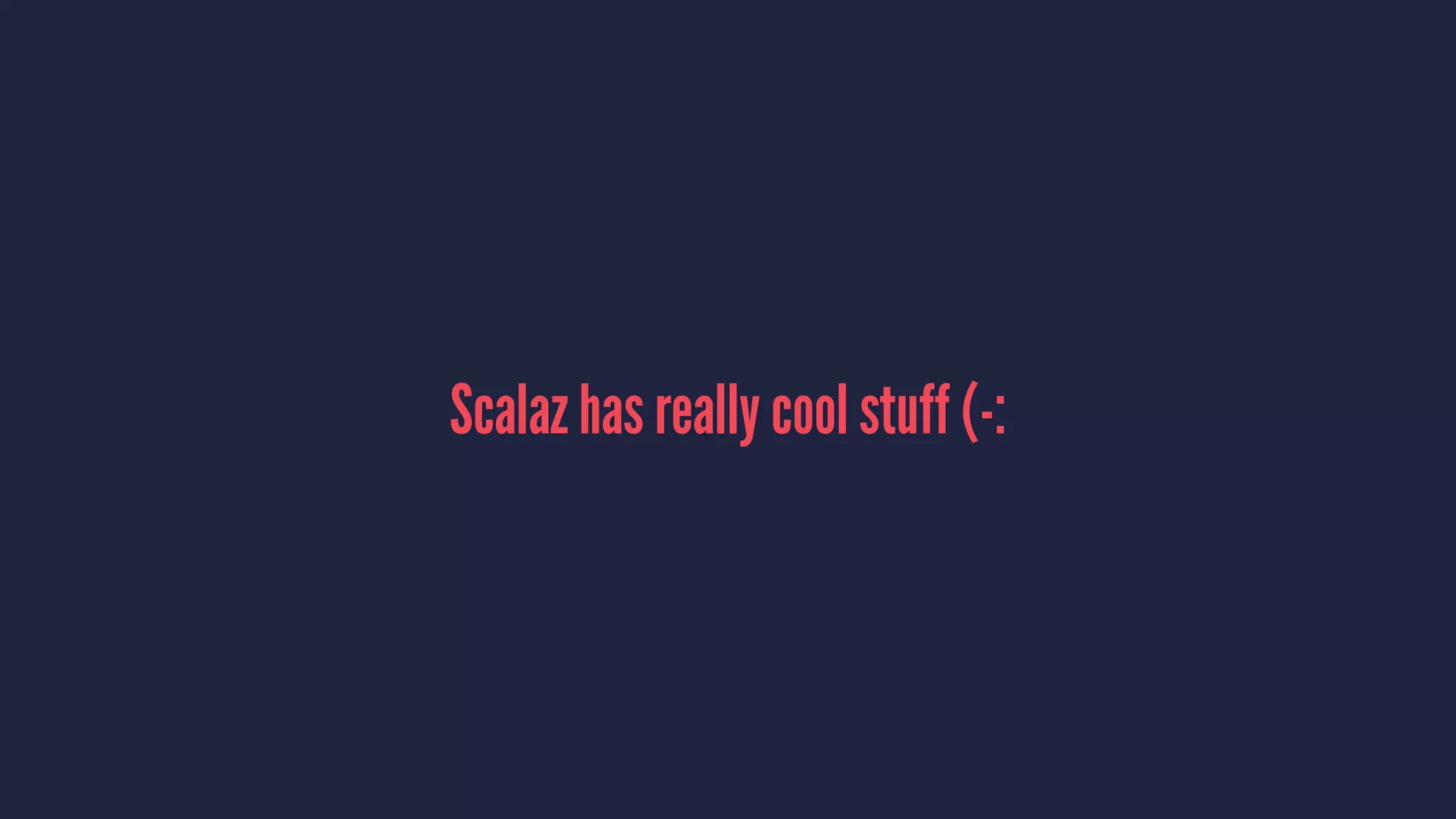
![On a lazy Sunday..
trait MonadPlus[F[_]] extends Monad[F] with ApplicativePlus[F] { self =>
//...
/** Generalized version of Haskell's `partitionEithers` */
def separate[G[_, _], A, B](value: F[G[A, B]])(implicit G: Bifoldable[G]): (F[A], F[B]) = {
val lefts = bind(value)((aa) => G.leftFoldable.foldMap(aa)(a => point(a))(monoid[A]))
val rights = bind(value)((bb) => G.rightFoldable.foldMap(bb)(b => point(b))(monoid[B]))
(lefts, rights)
}
//...
final class MonadPlusOps[F[_],A] private[syntax](val self: F[A])(implicit val F: MonadPlus[F]) extends Ops[F[A]] {
final def separate[G[_, _], B, C](implicit ev: A === G[B, C], G: Bifoldable[G]): (F[B], F[C]) =
F.separate(ev.subst(self))
//...
You read some code..](https://image.slidesharecdn.com/brabant-160713130544/75/Functions-Types-Programs-and-Effects-65-2048.jpg)
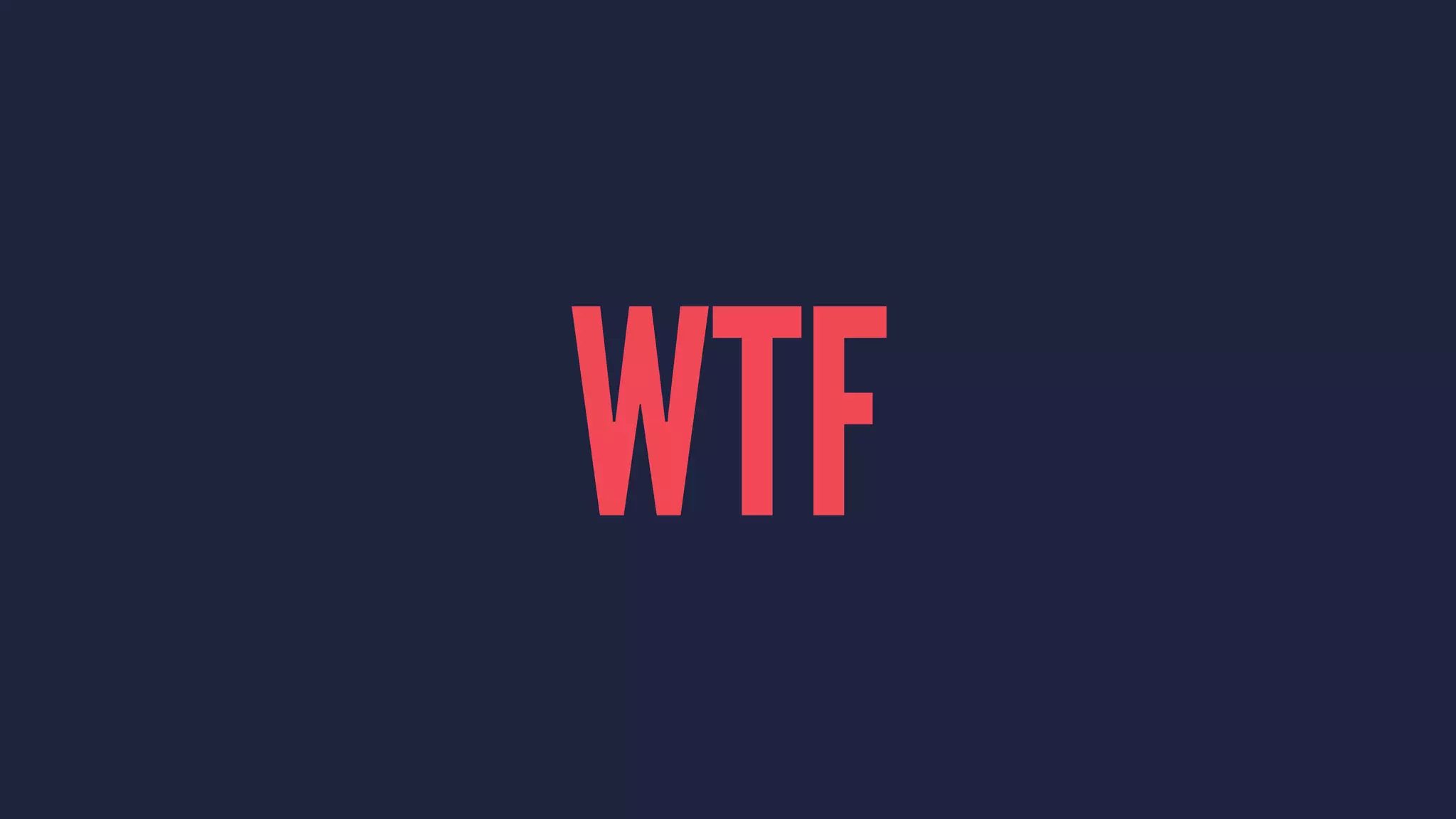
![But, separate is very useful.
def separate[G[_, _], A, B](value: F[G[A, B]])(implicit G: Bifoldable[G]): (F[A], F[B])
Remove everything, keep args and return value
(value: F[G[A, B]]): (F[A], F[B])](https://image.slidesharecdn.com/brabant-160713130544/75/Functions-Types-Programs-and-Effects-67-2048.jpg)
![(value: F[G[A, B]]): (F[A], F[B])
Remove remaining 'syntax'
F[G[A, B]] => (F[A], F[B])](https://image.slidesharecdn.com/brabant-160713130544/75/Functions-Types-Programs-and-Effects-68-2048.jpg)
![Lets substitute F, G, A and B to something we know
F[G[A, B]] => (F[A], F[B])
F = List
G[A,B] = Error / Result
4
4
/ uses infix type notation, same as /[Error,Result]](https://image.slidesharecdn.com/brabant-160713130544/75/Functions-Types-Programs-and-Effects-69-2048.jpg)
![List[Error / Result] => (List[Error], List[Result])
It's a function to separate the errors from the results!](https://image.slidesharecdn.com/brabant-160713130544/75/Functions-Types-Programs-and-Effects-70-2048.jpg)
